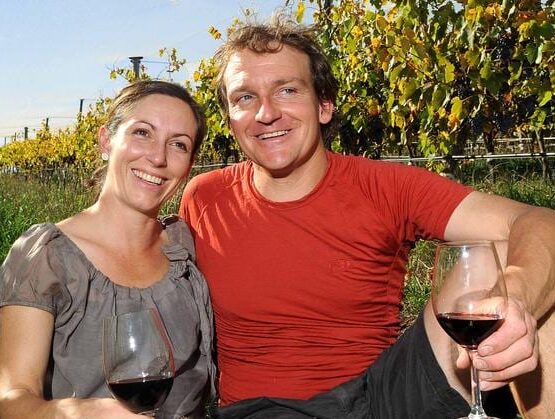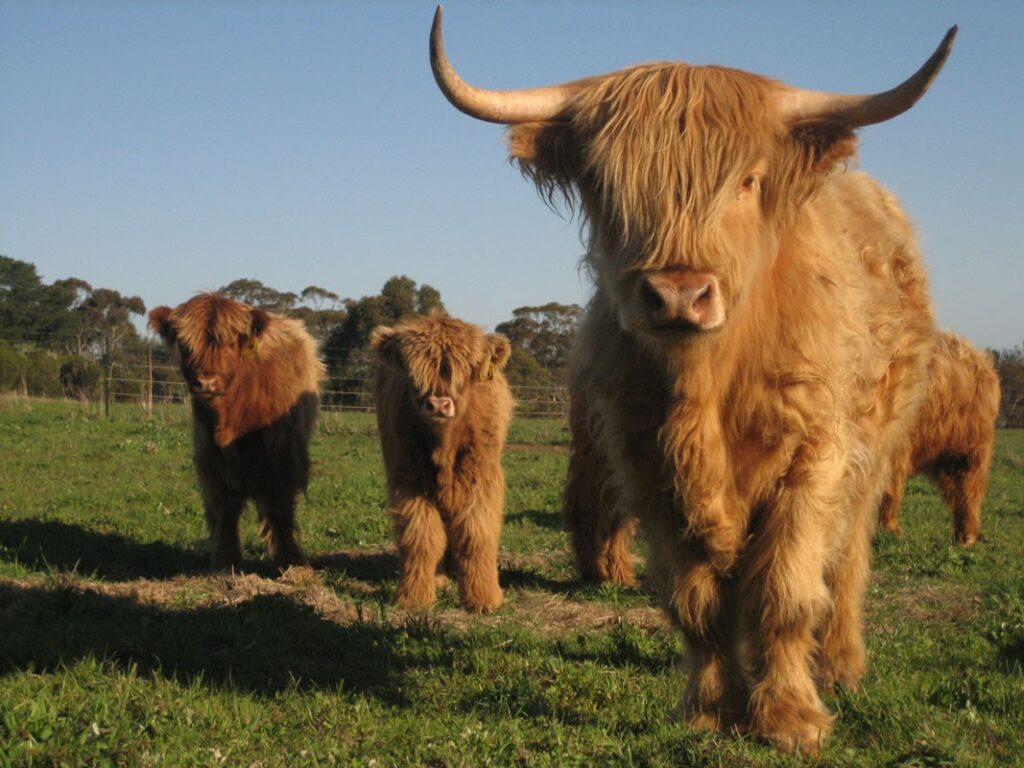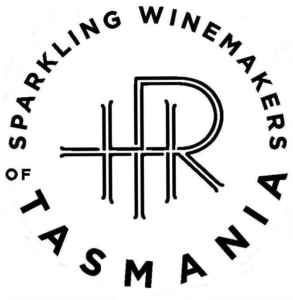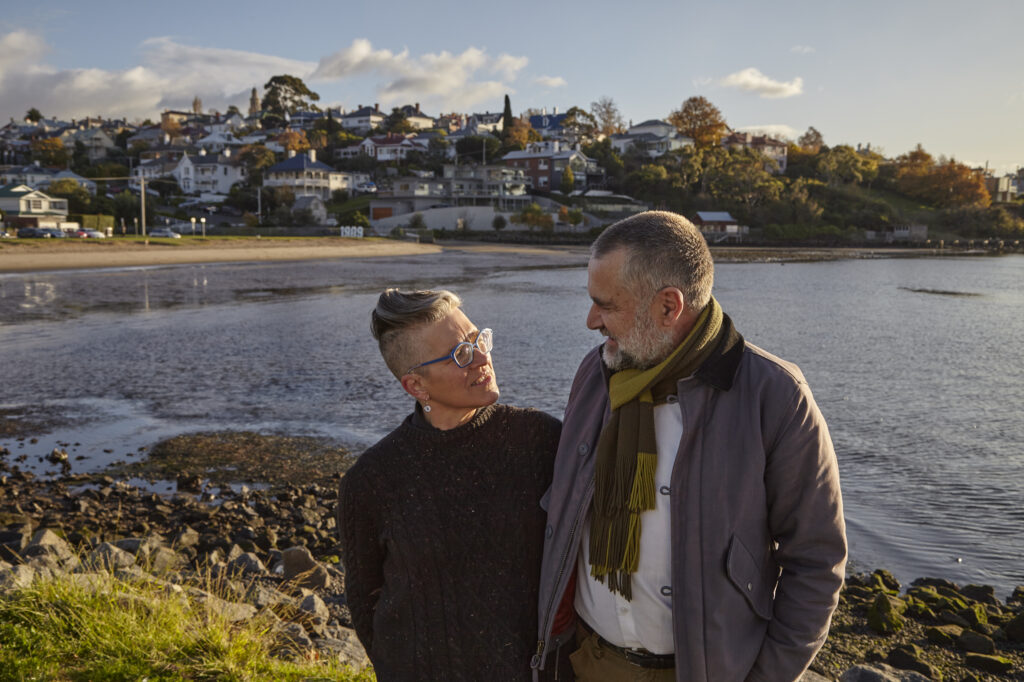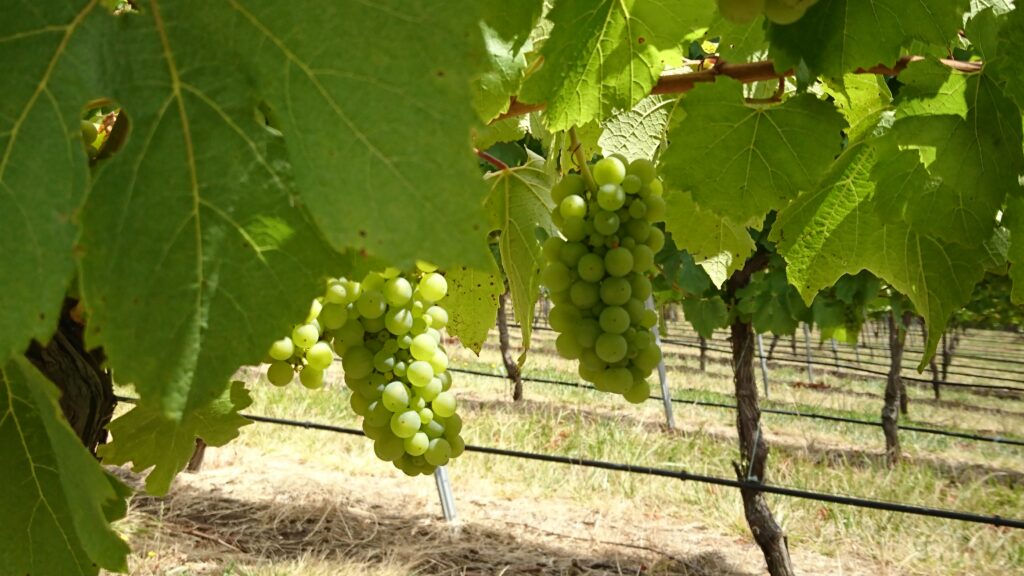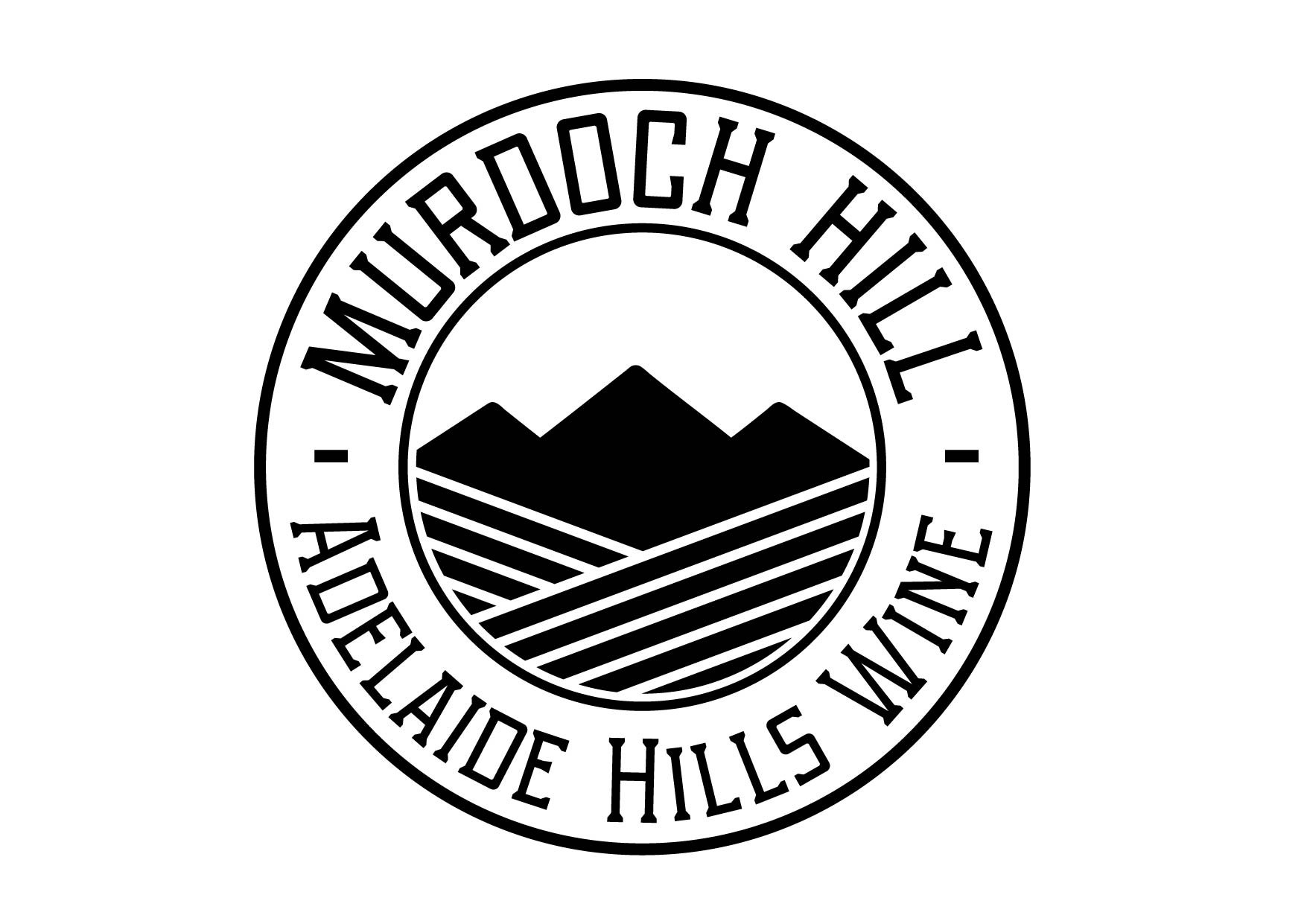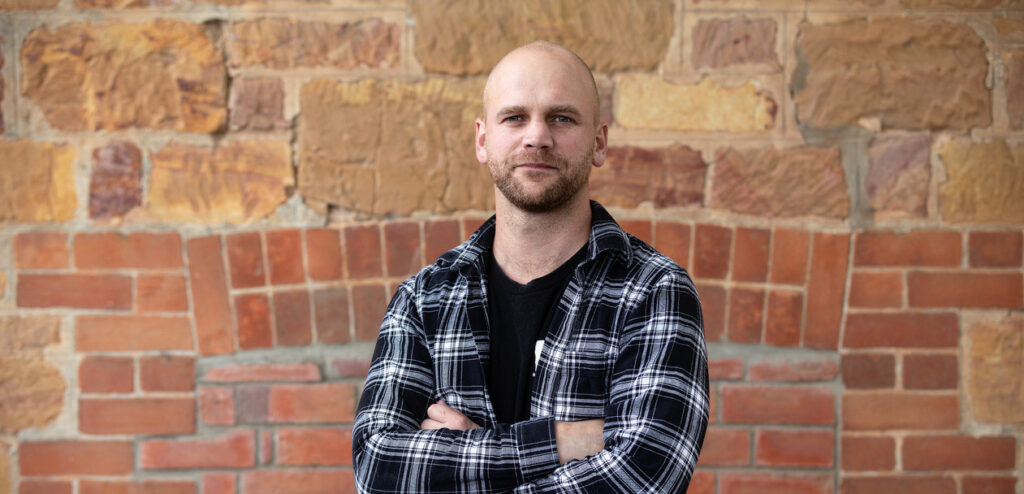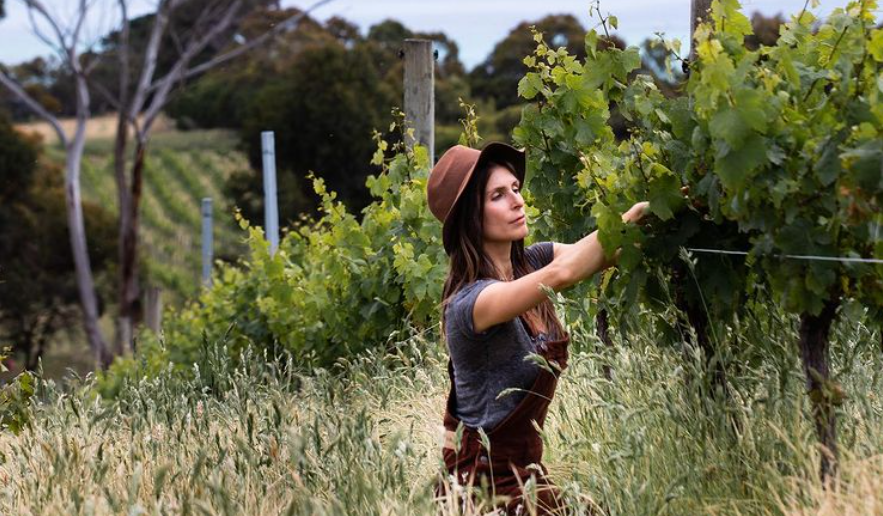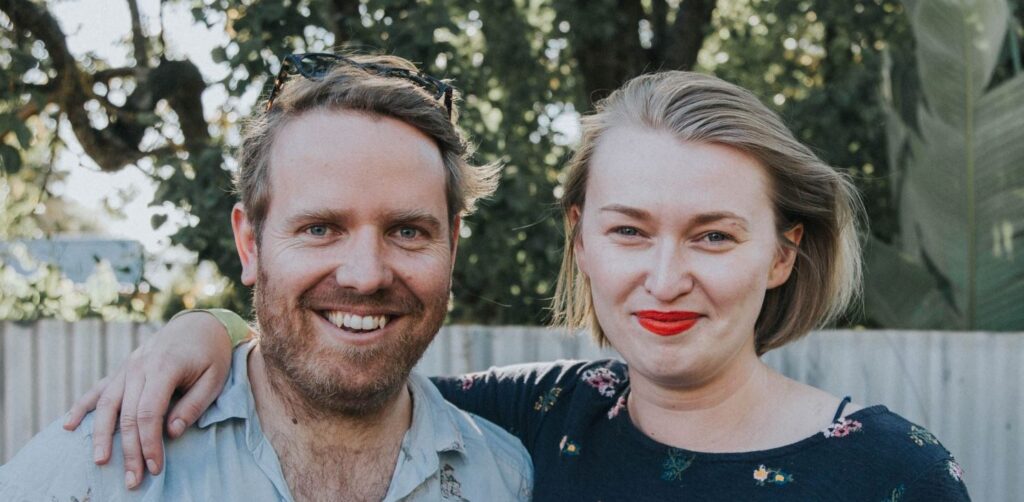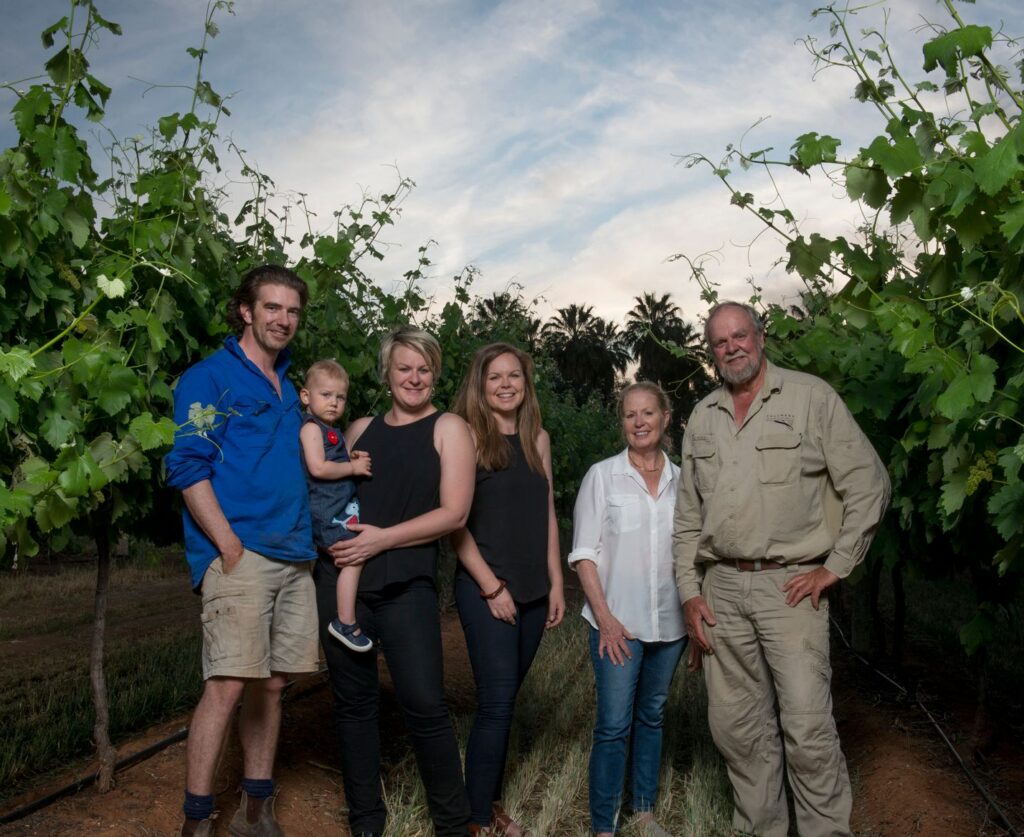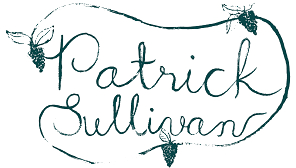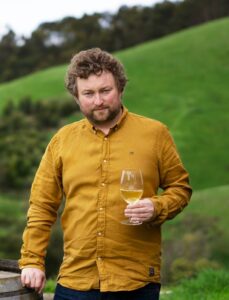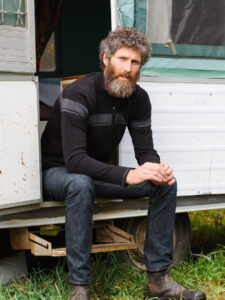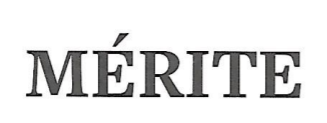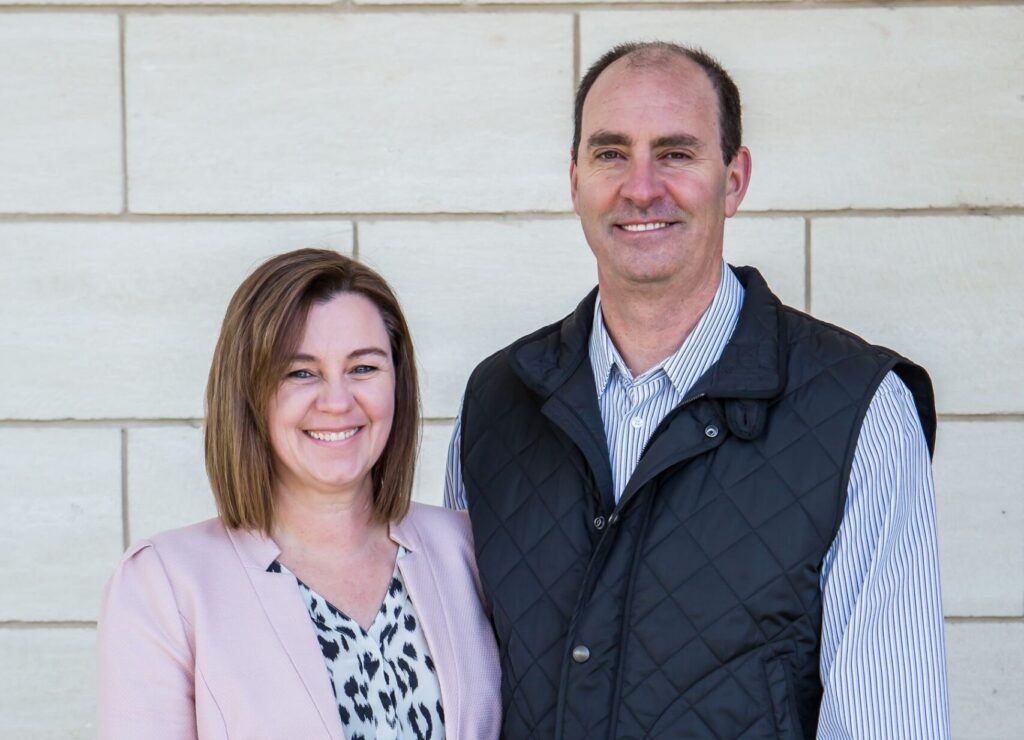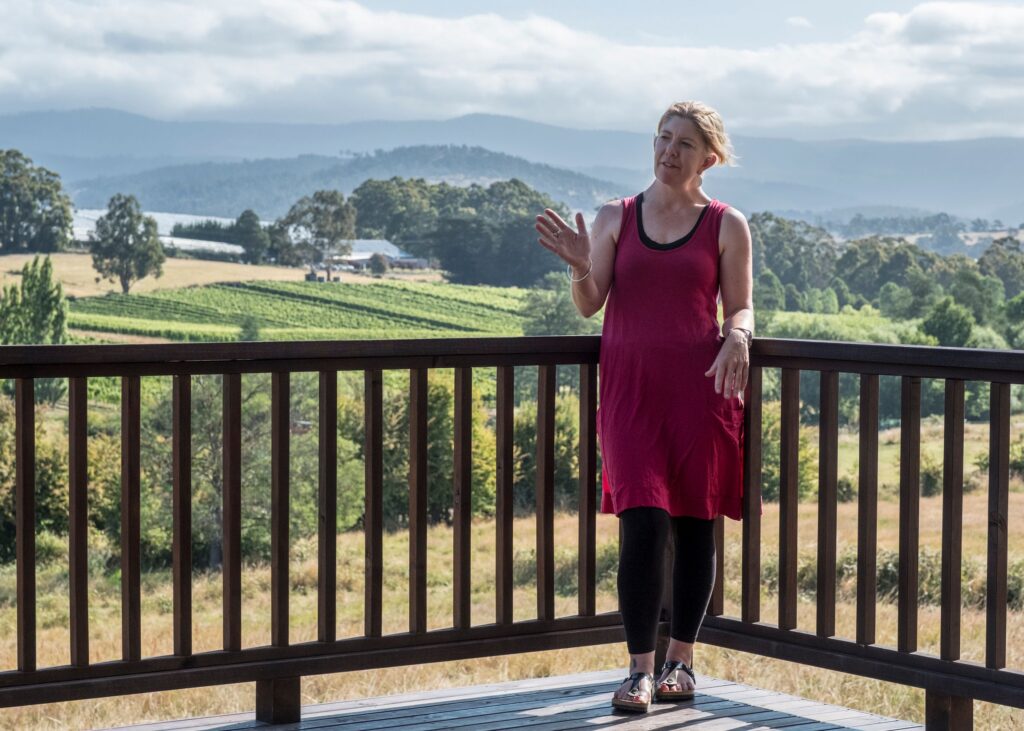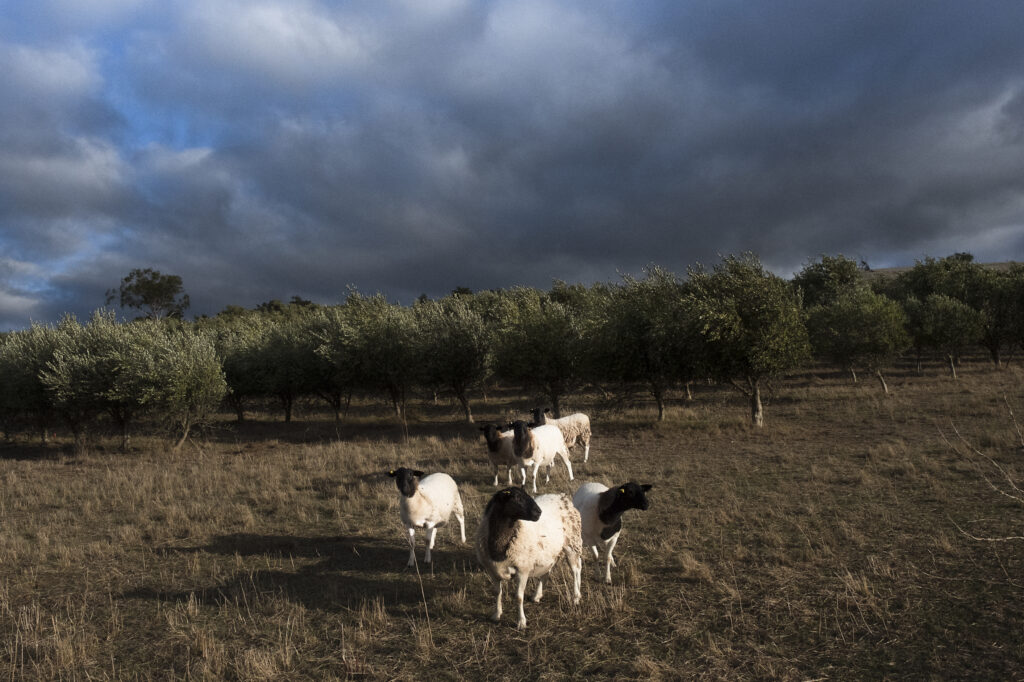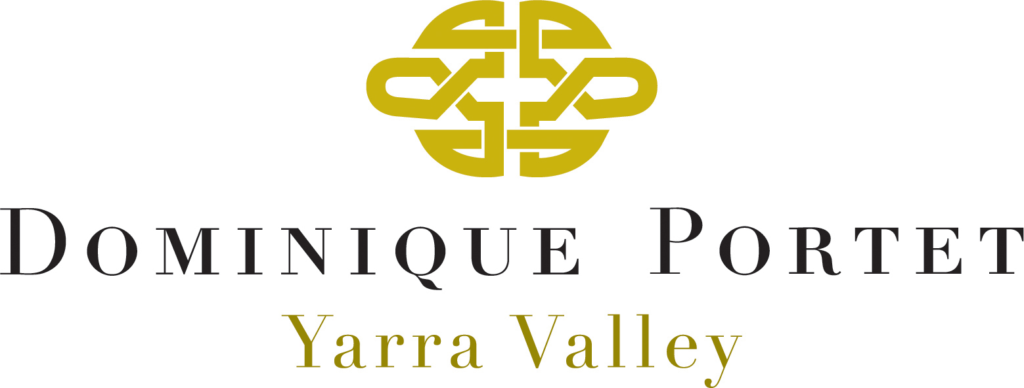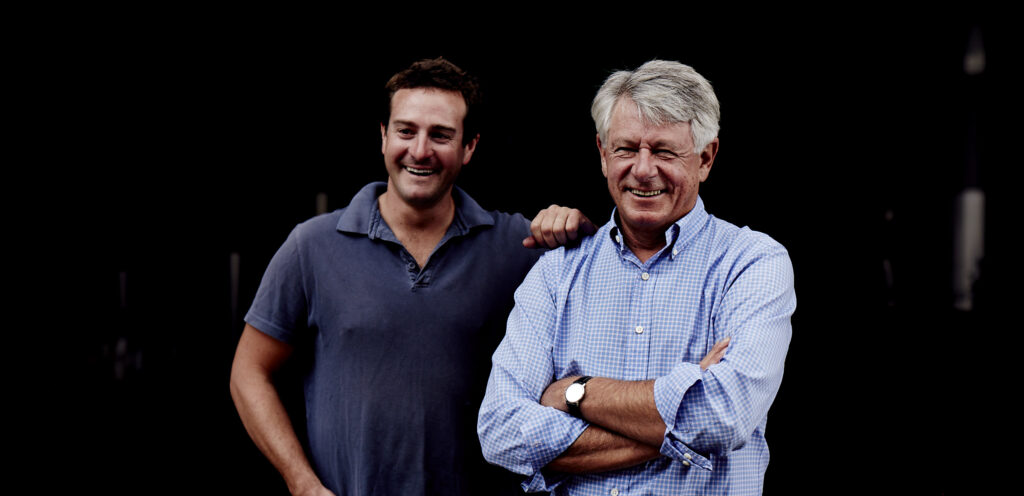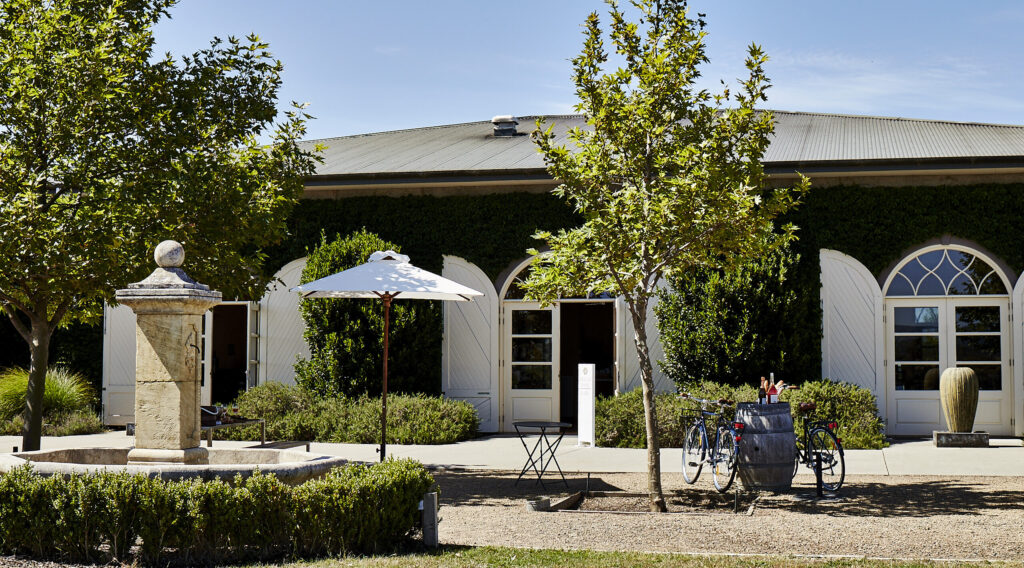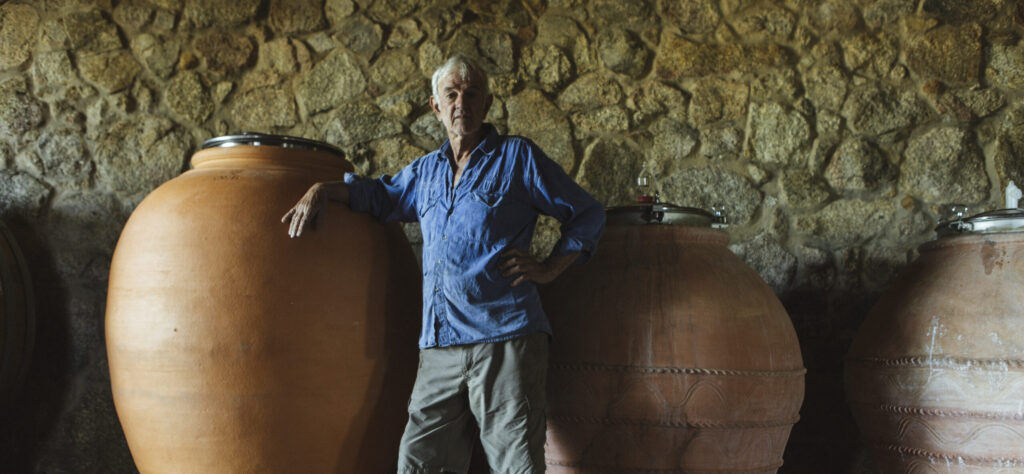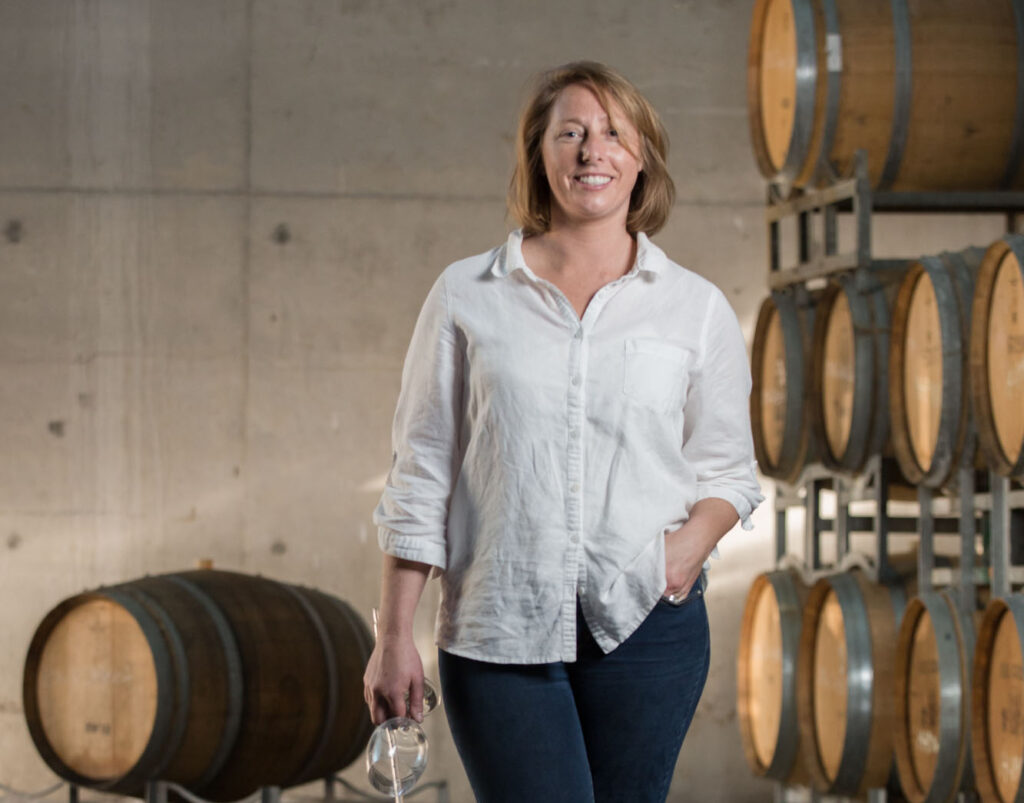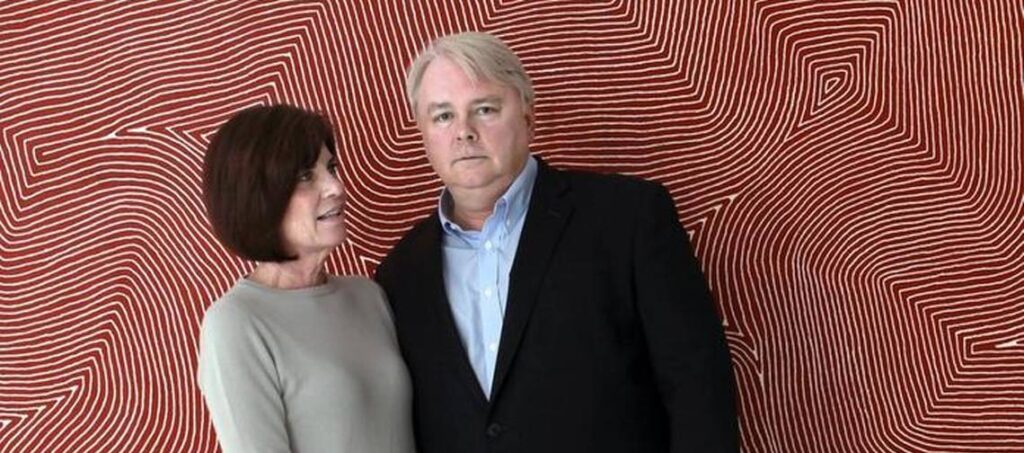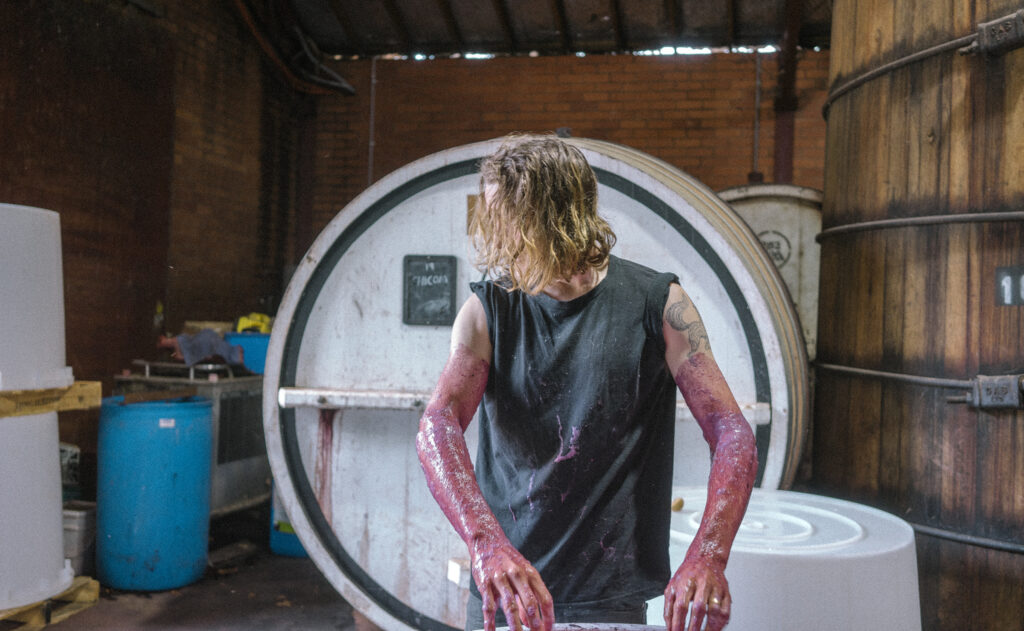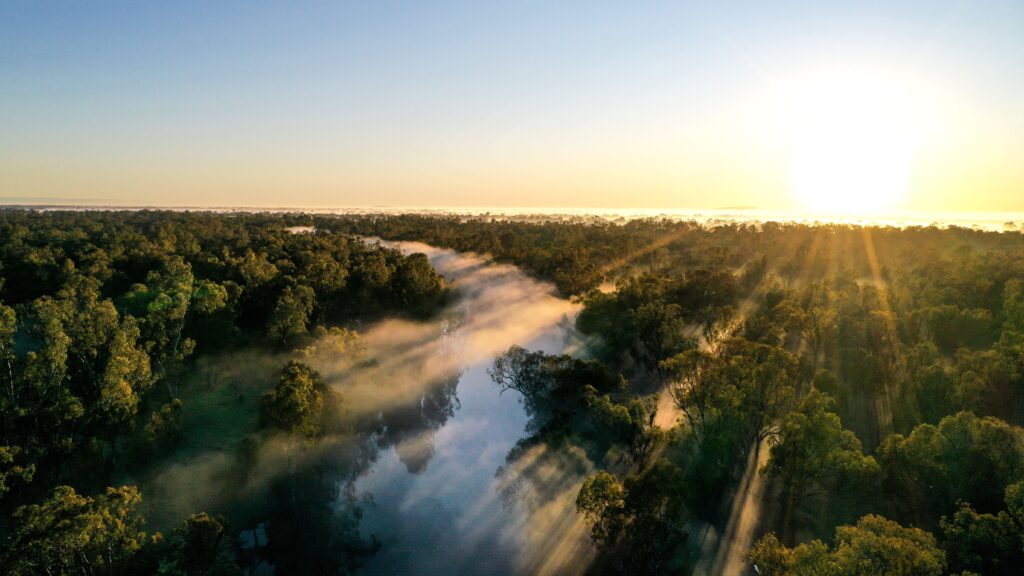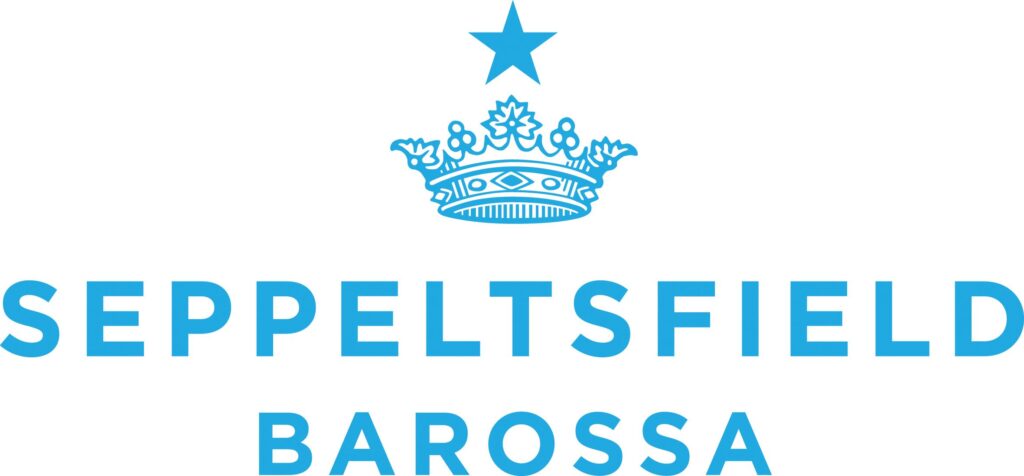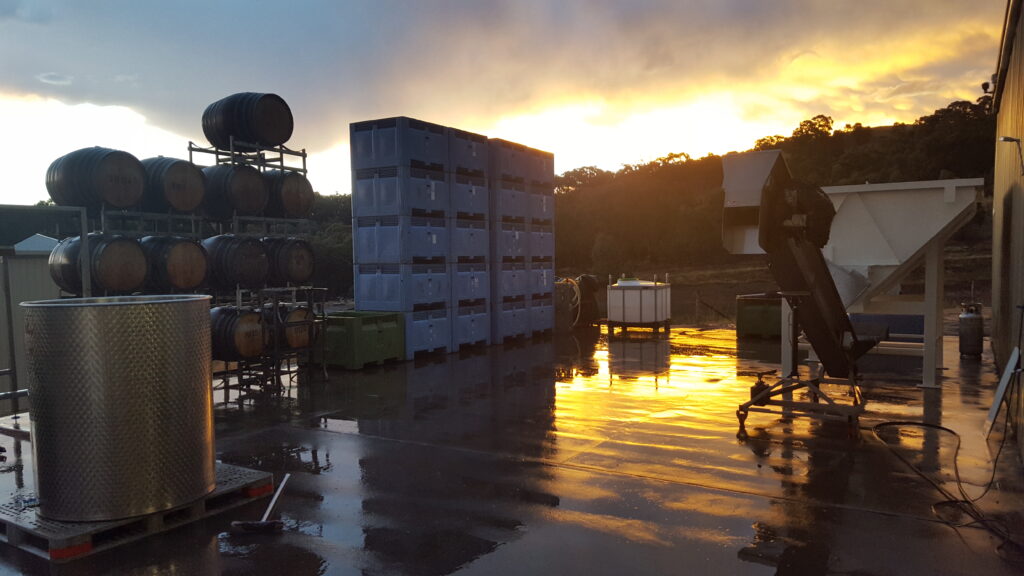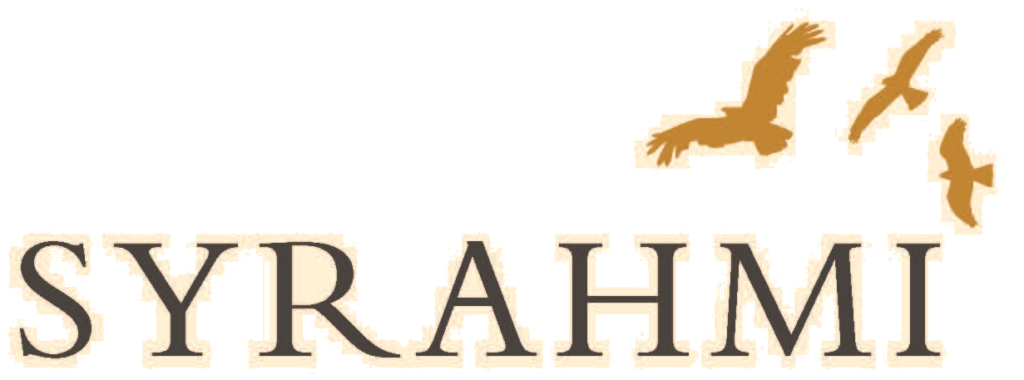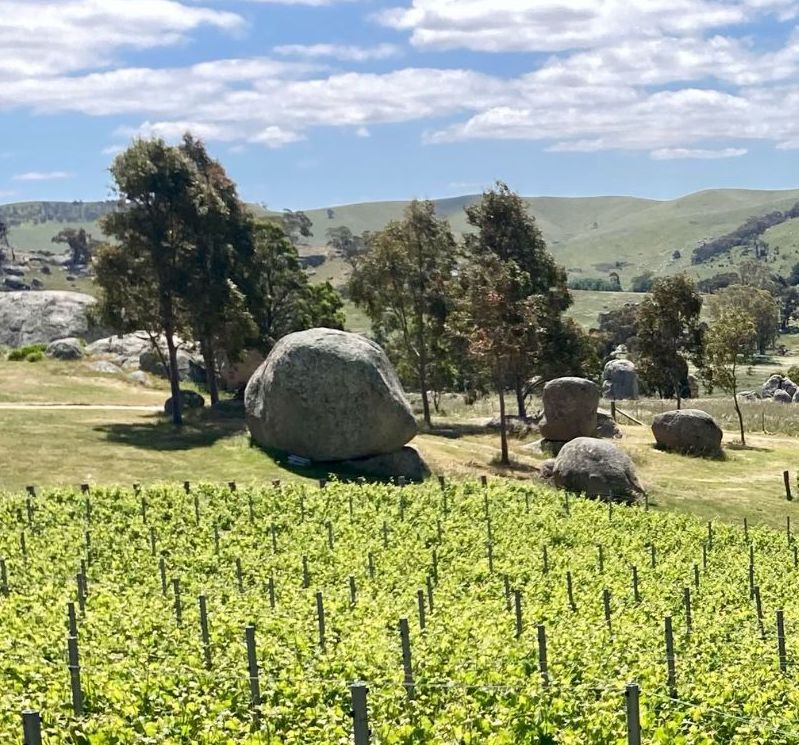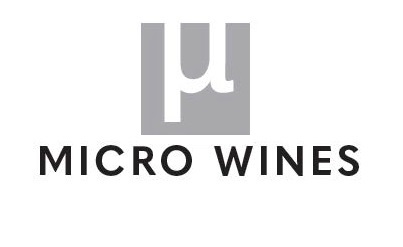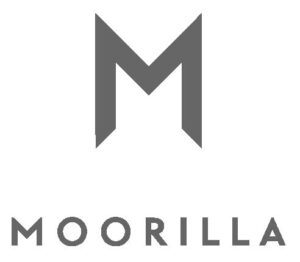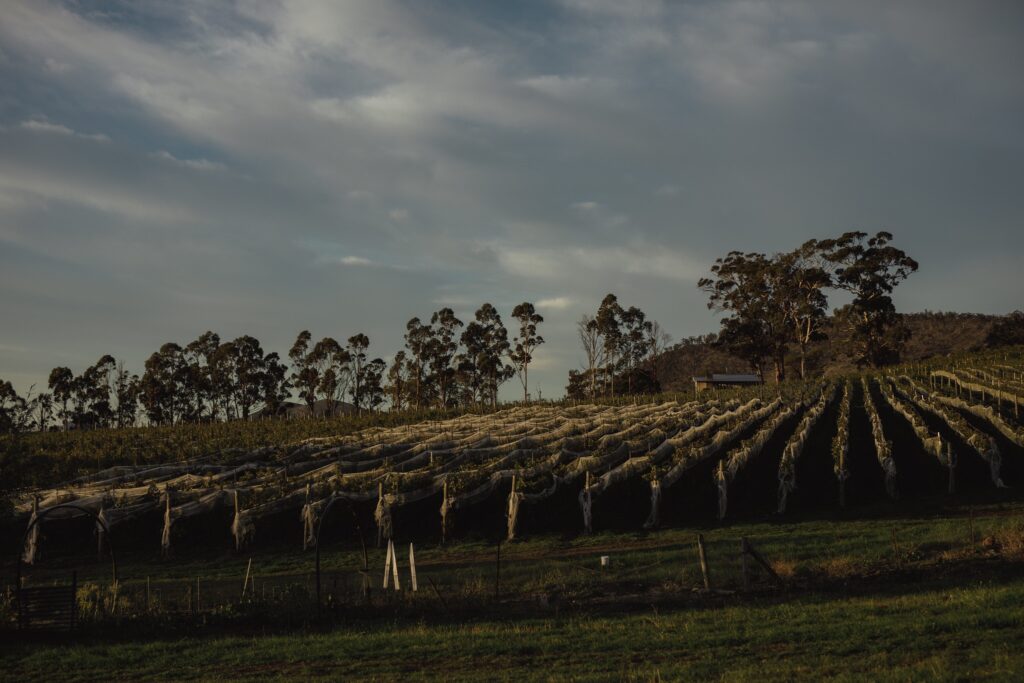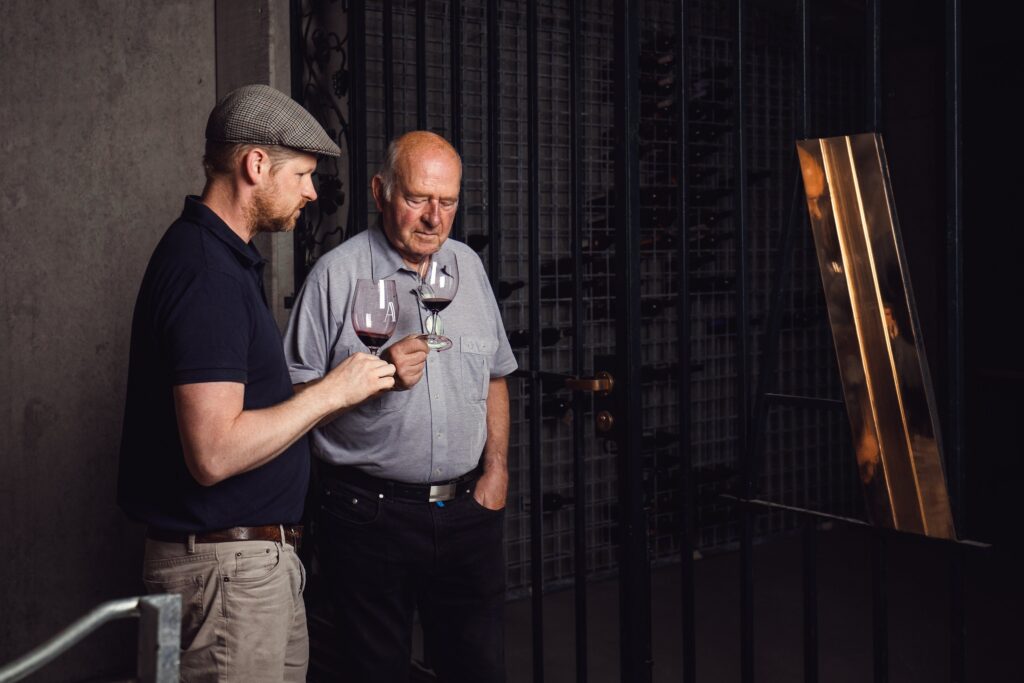The Legend Family: On People, Places, and Purpose
We asked each member of the LEGEND portfolio about their unique approach to looking after the land and the people they work with. It’s pretty moving stuff!
On Labor
Our small biodynamic vineyards, winery, mixed farm and market garden are family owned and run by Erinn and Janet Klein with a small, compassionate working team. We have 4 permanent workers employed all year around and hire locals and international backpackers during high peak seasons such as vintage and pruning.
Our team is remunerated at national award wages or higher, depending on their level of experience. We support our team to undergo further training and encourage further personal and professional development.
We hold regular team meetings and encourage everyone to be open and express any feedback may it be positive or negative, so that we can keep improving our work processes and run a healthy and happy work environment.
We prefer to avoid contract labor to ensure the outcomes are superior and to foster having a caring seasonal working team. Our staff turnover is very low, which we are proud of as we see our team a part of our extended family. We do not tolerate any discrimination or harassment of any kind in our working environment.
On Looking After the Farm and the Environment
We never really thought about being sustainable, as this is a natural lifestyle for us, to have a holistic farm approach, grow our own food, run livestock and give back to the land at least what we take from it. We grew up in families which care for the environment and naturally we are carrying this legacy on now with our own children and our business.
Ngeringa is passionate about ecological, biodynamic wine growing and everything we do and have created, revolves around this belief… small, closely planted vines, a simple, straw bale winery, a farm – entwined with the vineyard – of Scottish Highland cows, sheep and chickens, an abundant paddock of veggies supplying local markets, restaurants and private veg boxes direct to customer, a like-minded small working team committed to sustainable food and wine production, and extensive revegetation plantings to regenerate an Australian native ecosystem for regional biodiversity conservation and sustainable farming.
While we are constantly learning how to better farm sustainably and produce fine wines in a warming climate, Ngeringa stands as an exemplar of sustainability in our local, national and international food and wine community. We are regularly invited to host sustainable wine, food or biodiversity conservation workshops and field-days and have been awarded with Brand SA’s Sustainable Food and Wine Producer of the Year award in three consecutive years and have been inducted in to the BrandSA Hall of Fame.
Working with the cycles and rhythms of nature, rebuilding our natural native Australian environment and allowing the (healthy) soil, the site and the season to be expressed in each wine and in our food, the result is wine and food that is bursting with vitality, depth of flavour and delicacy – wines and food that express the care with which they were made and reflecting, with authenticity and integrity, their place of origin from Ngeringa.
On Labor
We now have our first direct employee – a casual cellar-hand (our 17 year-old son). He has a contract & formal position description in line with Fair Work Australia guidelines & is paid in accordance to industry award which means he gets a 25% loading for the intermittent nature of his workload, superannuation & is covered by workplace OH&S and workplace insurance. (Yes the paperwork etc took longer to fill out & cost more than he’s actually worked so far but it’s all there & done!)
We believe in the dignity of labor. Everyone has a right to be treated with respect at work, have meaningful employment & a safe workplace from which they return home healthy & unharmed. Also strongly believe in the right of all employees to organize (I’ve been a union member all my working life, still am). Where our growers & other partners employ other people whether seasonal/short-term/ casual/ permanent, full, part-time, we expect as a minimum that the relevant Australian awards & OHS systems are adhered to.
Our personal definition of profit entails making a positive contribution to gross domestic happiness.
On Farming and the Environment
Honestly think that it’s way past time to be talking about sustainability – that boat has well and truly sailed. We desperately need to be engaged in restorative processes & systems…
Okay, well from my soap-box: we are a tiny negociant producer so it would be very easy to plead that there’s not much we can do. While this has some truth it doesn’t let us off doing what we can – that understanding the vital need to engage in regenerative forms of viticulture & sustainable wine making practices means we have a responsibility to keep ourselves informed, look carefully at who we partner with & how they operate & engage/encourage/support them move to regenerative practices in their vineyards/ more sustainable practices in the winery. We’re part of the local Regenerative Agriculture Network (RANT), ASVO sustainability group & subscribe to the Regenerative Viticulture Foundation. The growers we source fruit from all participate in the Sustainable Winegrowing Australia program, which is a start/ bare minimum – next week I am going to visit a potential new supplier who is committed to regenerative agriculture.
The winery where we make our wines is solar-powered, grape marc is composted & returned to their vineyards etc but CO2 is just the craziest thing about winemaking – it’s allowed to blow-off at the fermentation stage then we pump the stuff from an external source back over our wines later. During my winemaking degree, I had to design a winery, so I looked at what CO2 capture & reuse systems were available – the technology is pretty simple but it was all purely for huge scale wineries… so we are playing around with our own home-made CO2 capture systems & yes we do need to explore the whole off-sets issue more. We don’t use animal derived products, fining is mostly just a little bit of bentonite, retain yeast lees as a nutrient source for the following vintage, I prefer to tirage with unfermented, concentrated grape must rather than cane-sugar (have to do the math on freezing juice vs storing wine with RS chilled vs cane-sugar).
On Labor
Murdoch Hill is a small family owned and operated wine business and we strive to give fair and safe work environment for all our staff. Australia’s Fair Work Commission has strict requirements in relation to employee conditions, including both minimum pay rates, working conditions and safety. Here at Murdoch Hill we strive to meet or exceed the minimum awards standards and provide our team with a fun, engaging environment, something that is always exemplified during the harvest season. Where good food and wine is shared amongst all to appreciate the joys of the industry.
The business has six regular employees across the winery, vineyard, cellar door and administration. Cellar door staff in particular are required to be paid significant penalty rates under the industry awards on weekends and public holidays. Per hour this can be to the equivalent value of 10 x Big Mac’s.
During vintage the workforce increases with an extra three staff on hand to support the additional demands of this busy time of year. In the vineyard, we use contract workers supplied by specialist pruning and picking contractors. We have strict processes in place to ensure contractors are meeting their obligations in relation to minimum wage rates, working conditions and safety.
On Looking After the Land
Our Vineyards are farmed with sensitive sustainable farming at our core. With the belief that healthy, happy plants produce the best quality wine. No synthetic inputs to control pests, weeds or disease, utilising mechanical under vine weeding to control weeds and organic sprays to control disease. We work to constantly improve our vineyard to grow the healthiest fruit possible. This philosophy means in the winery the grapes produce quality wine without the need for additions or manipulation.
“My goal is to create world class examples of the many varieties I grow without compromise. I am continually exploring new varieties and their suitability to our region and site, trying to predict the climate and the wine styles of the future; adapting both viticultural and winemaking techniques on our journey.”
-Mark Walpole
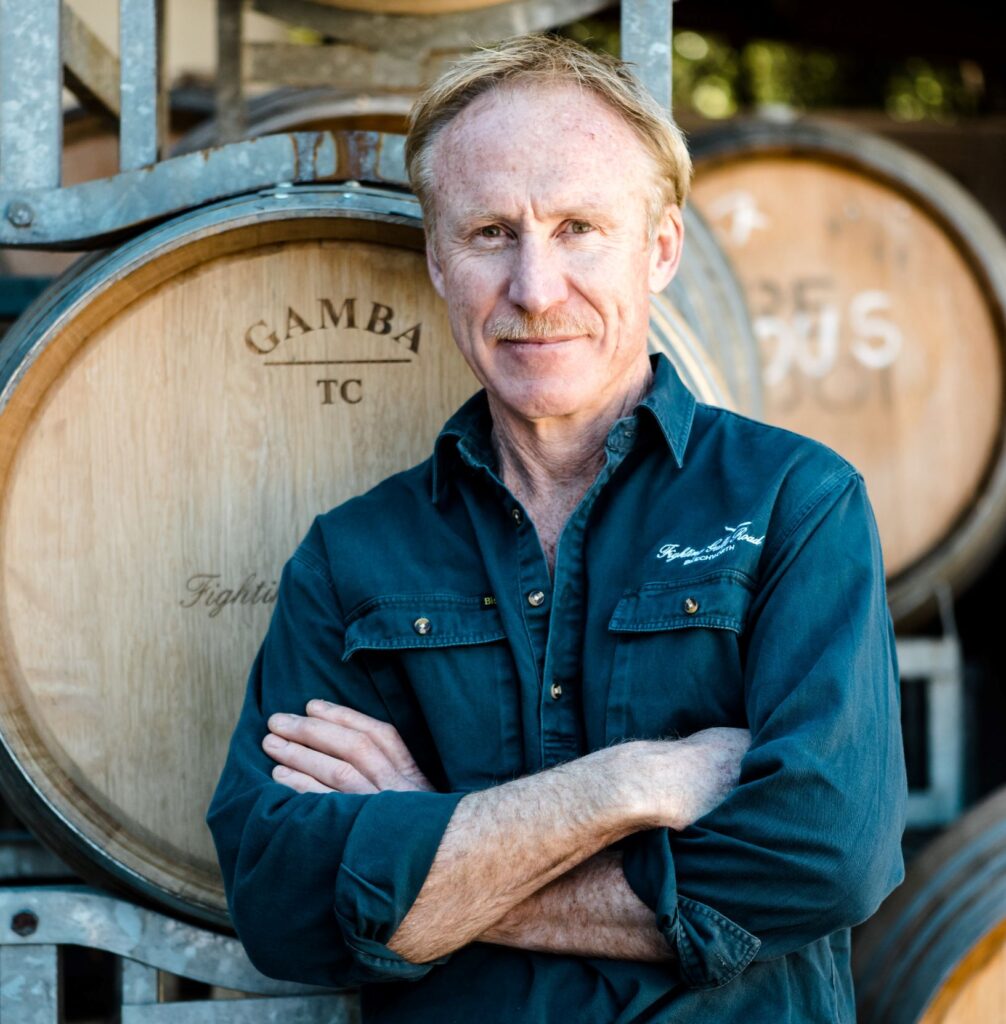
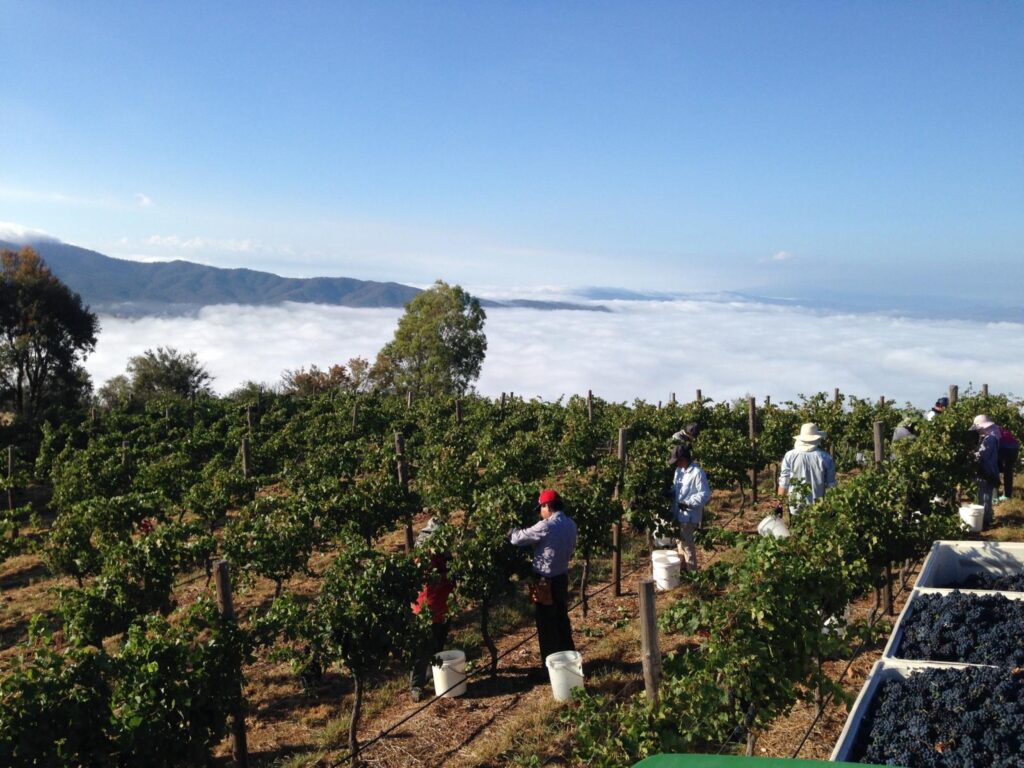
On Labor
Besides myself, we have one full-time employee who looks after most of the vine spraying and supervision of casual workers. Sourcing of labour in our region has been difficult as long as I can remember. Despite a national unemployment rate of about 5.5% a recent study suggests in our shire it is as low as 2% (which pretty much covers those people between jobs.).
That means we have to rely exclusively on backpackers and labour hire contractors. Other than the vintage period we have been able to rely almost exclusively on French and Italian backpackers for all of our pruning, vine training, foliage work, and shoot and cluster thinning. COVID put an end to that. We now have to rely almost entirely on labour hire. I have been working with one contractor for the over 20 years. Recent national laws introduced ensures all labour hire contractors are licenced and all employees are paid according to the minimum wage. We pay the contractor $32.50/hr, meaning that the employee receives at least $24/hr plus entitlements. (That’s $24/hr more than me!)
On the Farm
I operate on what I call a low-input sustainable system. It is neither organic nor biodynamic, but both environmentally and economically sustainable.
We don’t till the soil for weed control due to the detrimental effects to soil structure and vine roots, choosing to either do nothing (if the season permits); or use a non-residual knockdown to reduce competition for water and nutrients.
We avoid the use of tractors where possible to reduce fossil fuel use and soil compaction; preferring to use a quad bike. We use no synthetic insecticides and try and minimise the use of sulphur due to its detrimental impact on predatory mites (and humans working in the field). We use a selection of prophylactic fungicides to reduce the number of passes through the vineyard; and to have the least impact on beneficial insects. (We harvest black truffles every year, so clearly the fungicides are non-residual and not killing beneficial organisms! And when digging the holes, the soil is full of worms consuming all the plant roots and dead organic matter. All growth stages from very young to large, suggesting no toxic impact of the chemical on the invertebrates.)
Our vineyard is located in a part of the region which has low disease pressure, thanks to constant wind, helping to dry canopies and reduce vine vigour.
I think it is disappointing that we have got to the point where the consumer reads ‘chemical’ and automatically registers ‘bad’, in the environmental context. Why are the (toxic) natural elements sulphur and copper allowed to be used in organic production systems while ‘synthetic’ chemicals which have no environmental impact are bad? Arsenic, lead and mercury are also naturally occurring elements but would be frowned upon if used? My father used to use lead arsenate to kill caterpillars on the vines when we were kids. Highly effective! Organic!
If some chemical herbicides and fungicides was de-registered in Australia, and farmers had to return to cultivation for weed control, not only would there be a large reduction in food production, the environmental degradation would be enormous.
There has to be a balance. And that’s why I choose to farm how I do. If I was to use the organic chemicals ‘copper’ and ‘sulphur’ solely, there would indeed be residues of them in the ground. I believe what I do leaves the smallest environmental footprint that I can economically afford to leave.
On Labor
We undertake most of the work ourselves but when required we support fair labour practices by employing reputable labour hire contract companies. We pay an hourly rate 20% above the award rate which ensures the worker gets the award rate and is covered by Worksafe insurance. The contract company also receives enough to pay superannuation (mandatory retirement fund) and payroll tax whilst making a small margin. An 8 hr shift includes a 15 min paid break and a half hour unpaid lunch which is legally required to be taken.
On Farming
We work with grape growers who follow organic principles or at the least conscientious practices and try to encourage them to move in this direction. We believe in zero herbicide and zero pesticide use. Land stewardship is a privilege and we support growers who take on this responsibility.
In the winery, dry waste is swept before hosing down to reduce water usage. Grape marc is composted. Considering the low-tech nature of our wines, minimal power is used whilst producing them.
In October 2021 we planted our first vines and begun the development of a certified organic permaculture farm. Water conservation practices will be employed throughout the entire site and in the winery via rainwater tanks, mulching, the consideration of natural elevation and reed beds to recycle and reuse waste water. All organic matter will be composted onsite. Solar energy will be used. Our ultimate goal is to be self sustaining.
“To live one’s truth…I have always felt I was given the gift of another sense growing up, an awareness and deeper understanding that was special to me. I have forged my life path with the feeling that if I surrendered myself wholly to the cause, it would consume me and I will become it. That’s really how I got into wine, I didn’t just want to make it, I wanted to be changed by the process forever. Wine allows me to express my core self, it’s the medium I use to live my truth and I love every minute of it. I feel that if all of us had this sense of connection it would help our mental health and the way we approach our lives and others in the world.”
-Sierra Reed
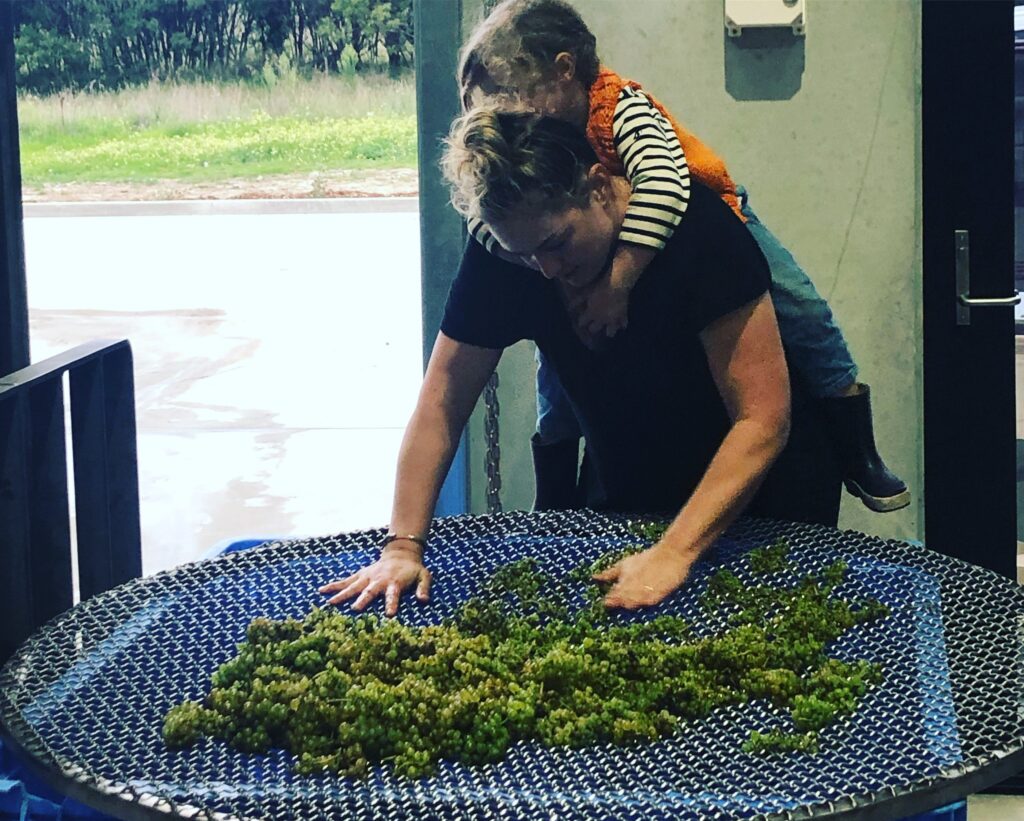
On Labor
With fruit picking I pay 25 dollars plus GST per head per hour and pay in full within a 3 day window. It’s a mostly all woman crew ran by a mother of 4 children who talks to them on video through the whole pick. We recently were on a site with no toilet so I had a porter potty brought in on-site which would never be the case in France or US.
My interns choose to come for the education and experience and get a room, food and daily living expenses. It’s probably worth just under a grand a week in value. I take them to all the places they want to eat and I open all the wines they never can get access too, I also cook all the meals and take care of them like I take care of Reed (my daughter).
On Environmental Practices
I continue to find ways to create impact while not owning my own vineyard, and the recent beginning of a short term lease on a 50yr old vineyard opens up a world of possibility, and responsibility.
Plastic is something we have to use and I have been looking into better bio products but they just don’t work and I end up using more. I re-used all my wrappings this year to cover the ferments and they are still going strong, I usually use 3 rolls of industrial film and this year it has only been 1. I tend to work with growers that have a sustainable or organic practice. No trash bags in the winery this year and when I’m draining my water press, I use the water coming out to clean. Coffee for the winery is in a cardboard box and it’s lasts about 3 weeks so no cups!
The really cool thing I’m proud of is the decorations of cut resin in the garden and in the concrete came from the local surfboard shop who had it sitting in a tip because it’s the waste after shaping, I fished it out and gave it a new life. I also drive all my skins to a friend’s farm and put it in a compost heap or have made grappa with it in the past. I even use my lees and tartrates as skin care products instead of putting them in the drain like everyone else.
At home we have compost and a garden that we eat from seasonally. We have had solar for 4 years now and put electricity back into the grid.
With a local seamstress, I am up cycling my old wardrobe and making new garments with old amazing pieces I can’t fit into anymore. I have made 10 items and 1 for Reed (my daughter). I am a no on fast fashion lady and never buy it!
I want to do my best to preserve the earth and the creatures in it for the future of humanity and I try and take steps closer to that everyday whether it be at work or at home. Awareness is the first step.
On Labor
Rasa is a two-person operation, Andy & Emma. We are a negociant at this early stage of our business and whilst we harbor hopes and desires to own and operate our own vineyards, we’re not there yet. In saying that however, the growers we purchase fruit from operate in a manner that we hope to achieve in the future. Small, family oriented and doing the majority of the work themselves. We assist with harvest and some pruning and where seasonal workers are required, they are typically the same from previous years. It’s a nice work environment with everyone chipping in.
On Farming
Sustainability is really important for us. We have a singular focus to obtain fruit that’s been grown in the most loving way possible. This involves minimal copper and sulphur sprays (made easier by the Barossan climate for sure). Mulching is great for this as evaporation and soil surface temperatures are reduced. No chemical fertilisers or systemic herbicides/fungicides. Compost particularly from winery marc is great at improving soil health. We try to work with varieties that can handle a warmer climate and are older established sites reducing largely the need for huge amounts of irrigation (supplemental in really tough years for survival rather than crop load). All of this leads to better balance that removes the need for any additions in the winery.
We are also happy to pay more per tonne of fruit to our growers that are motivated to do all of the above. Sustainability is a relationship with my growers that ensures they’re happy and willing to go the extra step rather than being fearful of getting dropped or told to rip a vineyard out to replant with the next fad.
On Labor
Our vineyards are family owned and run with all immediate family members working in the business daily. We have a close knit, small team of about 12 permanent staff across our two vineyards, nursery and winery and in the peak seasons we have a team of up to 50 which is always fantastically diverse in age, gender and cultural background. We pay at or above The Australian Wine Industry Award 2020 which ensures a high quality of living for our employees. Permanent staff have 4 weeks paid holidays, paid personal/sick leave and we are a family friendly workplace as we promote good mental health and work life balance. Health care in Australia is either free or affordable and the occupational health and safety of our staff is very important to us. Our permanent team are like extended family and many of our seasonal workers come back year after year because they love the positive, innovative and warm environment that comes with the type of inclusive and respectful, family operated business we choose to be at Chalmers.
On Farming
We take sustainability very seriously. Reducing our impact on the environment while growing and making the best wine we can is the core of our philosophy. Firstly the varieties we grow have been carefully selected over years of research and trials for their drought and heat tolerance, allowing us to reduce irrigation requirements dramatically. We also hone in on varieties that are hardy, with thick skins to reduce copper and sulphur sprays – no synthetic or systemic fungicides are used. The vineyards are managed with only organic nutrition (cow manure, compost, fish emulsion, seaweed extract) and the occasional trace element top up – no chemical fertilisers. We do manage weeds using a combination of mulch, manual weeding and non-residual, knock-down herbicide, however we only work with products that cause no ill affect to the microflora on the vine or the biodiversity of the environment or the soils. Our approach allows us to achieve optimum soil health, vine balance and excellent fruit quality while maintaining a happy ecosystem in and around the vineyard. In the winery we don’t add anything we don’t need to. Ferments are spontaneous with wild yeast, malolactic is natural and all our wines are vegan. Our winery water use is very low, we compost our grape Marc for use in the vineyard and we have 17.5 kilowatts of solar PV on the roof which powers the winery by day.
On Labor
Both William Downie and Patrick Sullivan wines, and the vineyards that are farmed jointly, engage few full-time employees and are in majority part ran by just the two of us. For workers we do employ, we pay above the Victorian award rate and ensure safe and healthy working conditions.
On Farming and Looking After the Land
You’re never going to put the land back to what it was. Once you’ve cleared those trees, it’s negative. But we try to make it as close to the original environment as you can. You have to look back 200 years and you have to look forward 200 years. How do you want it to end up?
If you don’t have a long-term vision, you’re not going to stick to the financial sustainability. You have to have an understanding of the business. What’s that saying? You can’t be green if you’re always in the red? There’s obviously an interaction between financial sustainability and environmental sustainability. We live on a farm for that reason: because we want to see a change in the way agricultural land is managed in Australia. And the only way we can make a difference in that respect is if we are able to stick around.
All vineyards are ACO (Australian Certified Organic) biodynamic and organic in conversion. Guendulain Farm, Bill’s estate vineyard, is ACO certified organic since July 2021. We have planted a good few hectares of native revegetation, with a view of improving biodiversity and soil health in the non-agricultural parts of our properties (and making sure there are non-agricultural part of our properties).
We’ve had instances where we’ve had to spray phosphoric acid – every other aspect of the viticultural management in those sites is completely organic. We’re of the opinion that there are non-organic compounds – like phosphoric acid – that are far less toxic to the soil than copper, which is compliant for organic certification. What we want to do is regenerate as much as we can and leave it better than when we found it – much better. The question is what have we got to do to get it there? We don’t chase certification, we chase that outcome.
On Labor
We purchased the land to establish our vineyard in 2000. Many of our pruning and hand work crew have worked with us since the days of planting those baby vines – over twenty years. Some of the seasonal work done on our vineyard is done by contractors, like harvesting or pruning, rather than employees and they tend to be local family businesses, often employing more than one generation within the family, much like the tradition of great family-owned restaurants we saw in the USA. All contractors are certified through a rigorous reporting standard set by the South Australian Fair Labor Board, and ensure that the minimum award of $26/hr is met while ensuring OSH standards.
On Caring for the Land
Our vineyard is the closest, as the crow flies, to the World Heritage listed Naracoorte Caves, which were given this recognition due to the fossil finds of megafauna like Thylacoleo and an endangered microbat population. These tiny furry bats feed on insects, not fruit, and are the size of a thumb. They stream out at dusk to feast, often attracted to spirals of insects in the warm air at sunset. For the first few years, we assumed the things swooping over our heads at dusk were large moths, until one landed on Mike’s shoulder and we realized they were actually microbats.
We also have a massive Wedge Tailed Eagle nest in an old tree in the middle of our Merlot parcel. I know! They are a magnificent bird with a wingspan up to 9 foot, 4 – larger than a Bald Eagle. We have echidna and a number of friendly blue tongued lizards that eat vineyard pests like snails and ants. There is a National Park wetlands in our region that attracts birds in the winter and spring, who visit our land to eat insects in winter and spring.
This is all to say – it is important to us that we encourage beneficial organisms and a richly diverse ecosystem, rather than spray insecticides or other systemics. We focus a lot on beneficial insects. Of all the chemicals, insecticides are the worst to people, the natural balance in the vineyard, as well as affecting the birds and bats. Becoming aware that these things were there before us and how they interact, has made us more conscious and careful about how we manage the vineyard and our farm.
We use organic inputs whenever possible to encourage healthy biodiversity in the vineyards; we only use chemical inputs when it’s absolutely necessary and we know it will not affect the long-term safety of the land and the animals who call it home. We started as growers and still sell a majority of our fruit every year, which ends up in export to the EU, USA, China, and other countries around the world. There are very specific protocols about chemical residue in these grapes. You have to really be on your game to produce A grade fruit in a maritime climate without any chemical residue in those grapes for acceptance into every export market.
On Labor
Stargazer currently employs two full timers; myself and my vineyard manager/assistant winemaker Bryn Williams. Bryn is paid a salary based on the SAWIA annual salary survey for what others in similar positions such as his get paid. He also has a job description and an employment contract. We conduct reviews every six months and salary reviews annually, focusing on achievements and goals, and he is encouraged to attend tastings and workshops/training in his areas of interest (beekeeping for example). He has been with me now for over two years and is a huge asset.
Vanessa Bresnehan has started with me just before vintage on a casual basis helping me out with bookkeeping, logistics and supply, and more and more mailing list/wine club maintenance. Vanessa and her husband James have a vineyard in Campania and two kids so Vanessa has the flexibility to work for me between school drop offs and her other commitments. Perfect for me and for her! Vanessa is paid according to the Clerks award and I’m currently working on a job description for her.
All other labour requirements (when we need a hand in the vineyard) are filled by local contractors. I predominantly use Mark Hoey of Specialised Vineyard Services, who supplies pickers and vineyard hands when required. Mark pays his employees according to the Wine Industry Award and like all contractors, is required to sign a contractor safety declaration. This confirms that contractors, sub-contractors and any employees under their control shall follow safe work practices and comply with all environmental/legal/regulatory requirements while working at Stargazer.
Looking After the Land
Whilst not organic, we have transitioned to an organic fungicide program in the 2020/2021 season and are currently exploring options for mechanical under vine weed control so we can also transition away from traditional herbicide programs whilst at the same time doing the most sustainable thing for our soils (the combination of a steep rocky site with young vines means that undervine cultivation is not really an option).
To assist with weed control, we have used a small flock of sheep in the vineyard in winter for the last five years. The sheep are part of our broader approach to sustainability (which I think is a too-easy throw away word in a lot of respects) which focusses more on bio-diversity. To that end, over the last couple of years we have: started an re-vegetation project which last year saw us plant over 700 bee and bird friendly natives (we hope to continue planting each spring); captured a bee swarm last spring who are now safely housed in their own hive, hopefully we’ll be able to do this again next summer; relocated 200 olive trees to an area which is unsuitable for vineyard; planted more than a dozen nut and mulberry trees as well as a feijoa hedge as a wind/shelterbelt and we are gradually filling this area out with bee-friendly perennials; trialled seeding with buckwheat in areas alongside the rows to encourage beneficials as we have permanent swards inter-row rather than annual cover crops.
From a winery perspective, I reviewed all packaging last year to ensure that all suppliers are members of the Australian Packaging Covenant. I’ve also switched to lighter weight bottles and we’re now using a recycled kraft tape for the cartons.
“Our philosophy is to have fun while making wine & at the same time respect the people we work & deal with. We have fun because we involve family, friends, colleagues, growers – involve them into our winemaking process, infecting them with enthusiasm, make them a part of the wine & our journey. We often make quirky wines, experiment, do things differently, follow our own rhythm, get inspired by others, constantly listening & learning, never sit still, eat, drink & love.”
-Glen Robert, Andrew Scott, and Robert Richter
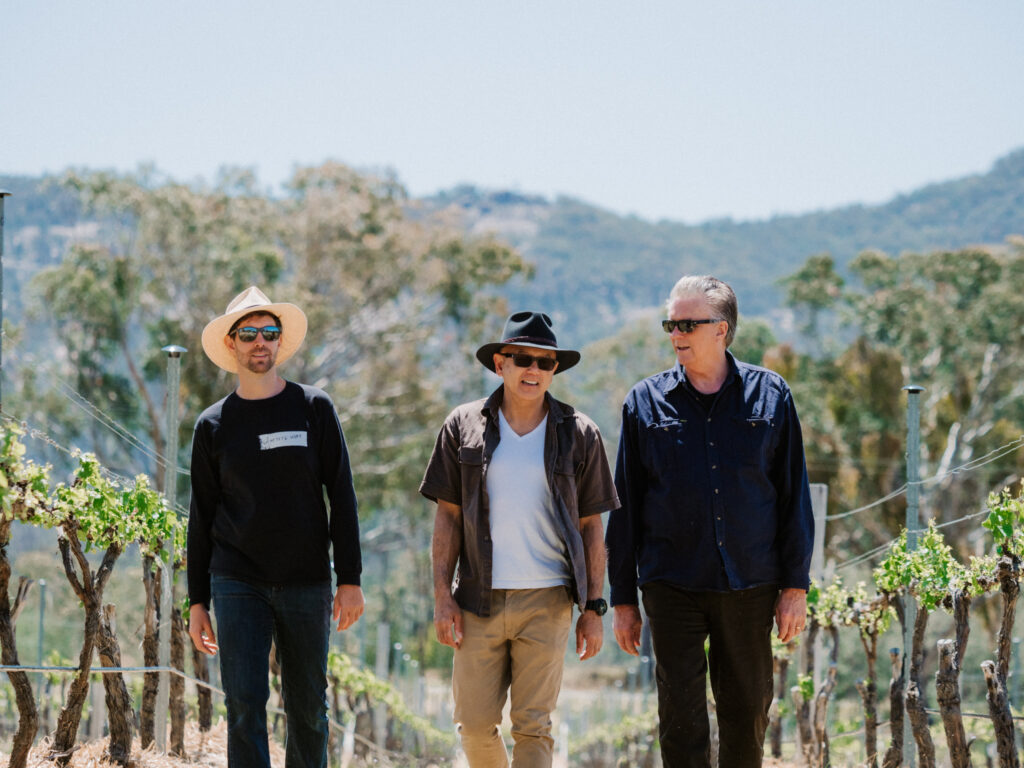
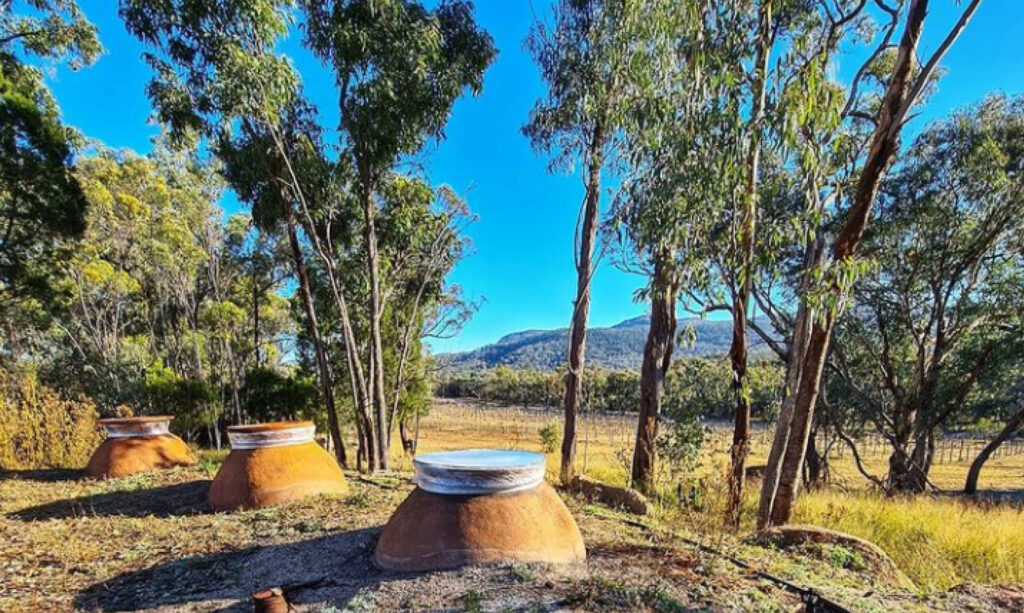
On Labor
Only 3 hours drive south-west of the city of Brisbane & our hometown, we remain close to family & friends. They frequently visit, help in the winery & vineyard & are a great part of our success! Our village of Ballandean is also close knit & supportive, a stereotypical country community. Sometimes I (Glen) feel like I’m living an episode of Schitt$ Creek!
We hire a full-time cellar hand, Kyle. He receives wages above the Australian Wine Industry Award 2021, 4 weeks paid annual holiday, paid sick leave and has been given pay rises at every review, rewarding him for his excellent work! We encourage him to improve his skills & this year he is making wine for himself at the winery & we are helping him establish his own wine brand & business.
During busy working times, either during the grape growing season, picking, & pruning or bottling in the winery, we often hire casual workers who are also paid above industry standards. They range from all ages & we pride ourselves as equal opportunity employers.
On Farming and the Environment
With 1km of water frontage & one of the most secure water resources in the region, we knew we could make a sustainable business here. Grapes don’t need much water to grow & thrive, so our irrigation needs make minimal impact on our lake. We established the 3Ha vineyards from scratch, planting such varieties as Shiraz, Merlot, Tempranillo, Marsanne, Verdelho & Nebbiolo. About 70% of the property is still wild eucalyptus forest & our lake attracts many wild native animals.
Once our vineyards were established, we grow them under Lute Raisonné principles: minimal application of agrochemicals where they are only used when necessary & not as a matter of routine. We follow many organic principles, frequently applying compost to the vines & recycling waste from our winemaking practices.
Sustainability is everything when running a business & is at the core of our principles. Mostly following organic principles results in minimal impact over the wild flora & fauna surrounding the vineyards. We maintain a wild grass cover crop between the vine rows to encourage a balance of insects & animals. Minimal drip irrigation of the vines helps conserve water. Most heavy energy using activities such as bottling and pumping water for irrigation, are done during the day when we are harvesting our own solar energy.
Any suitable solid waste is composted on site & later applied to the vineyard. Winery organic liquid waste is drained into settling ponds, growing native reeds which help minimise, filter & purify the effluent, following permaculture principles.
We are a hungry winery & we buy grapes from select growers. Relationships are important to us & we have excellent rapport with our growers. Instead of buying grapes by weight, we ask for an allocation of grapes from a particular location in a grower’s vineyard, paying a premium for the privilege. We ask our growers to follow similar principles to ours for our allocated vineyard site so we can guarantee all our grapes are grown with best practices.
On Labor
Like many small wine businesses, we run pretty lean with Kristen and myself (Garth) doing the bulk of the day to day work. We have one extra staff that works in sales and occasionally helps with other work. As far as making wines go, we are in the fortunate position to have a good relationship with a larger winery in the region and for a processing fee, they allow me to access their equipment and store our wines. While I get to do the bulk of the work (which ensures we get our wines made in our way) it does give me access to some help if I need it.
We are starting to lease and manage a portion of our vineyards. Work will be completed by myself and a partner in that business or through a casual labor pool. Within Swan Valley we are fortunate to have access to labor hire and being close to Perth (the Capital of Western Australia) we normally have an adequate number of skilled agricultural workers for pruning and picking. Our employee is well remunerated for their position as we are chasing quality workers and believe that we need to remunerate well to get this. Where we use casual labor pools or other contractors, we know that these businesses are paying above award rates and this is necessary to ensure that they get good and reliable workers. As our businesses grow in terms of production, vine management, property ownership, facilities, and cellar doors we envision that we will return more to our region in terms of the employment that we will provide.
We believe in remunerating workers well and creating a fun and rewarding environment for them. In return we get good and efficient work ethic allowing us to run well but in a lean sort of way.
On Environmental Decisions
We question everything that we do. We believe that the natural wine movement has raised a lot of good questions in terms of the way we make our wine. We pursue varieties that already exist in our region and suit the climate and allow us to make wine with low additions. We are trialing varieties that should suit our warming climate that have good flavors and natural balance with the aim of producing wine with low additions. We are not averse to making the additions that we think are required when we think they are required to make the best possible wine that we can. To us the natural wine movement has too many rules in this regard. Sulphur dioxide which is used to preserve wine is used in a minimal but timely way. With our white wines we add this soon after ferment is complete and before Malolactic ferment commences to lock in the vibrancy and natural acidity of the fruit. Red wines are not fined and in the rare case that we do use finings they are pea protein based, so all our wines are vegan.
We have just started managing a portion of our own vineyards and this should soon be 50% of our fruit requirement. We work with several other 30 to 70yo small and often dry grown vineyards within the region where we purchase fruit. Some of these are managed organically and others managed traditionally by older farmers with minimal inputs. It is hard to teach an old dog new tricks and they are great old vine vineyards that thrive on a level of neglect but are not managed entirely organically. We continue to work with these farmers and in time hope that all practices will become organic. We feel when the fruit source is good that we are adding to this vineyards chance of survival to another generation, and this may be when we can influence the practices. Saying this the vineyards are sustainably managed and are often just one spray choice away from being managed organically.
I guess we also question the organic and biodynamic philosophies. The end game is great which is encouraging healthier soils, well-structured and full of organic matter and beneficial micro-organisms that help create healthy and robust vines in pursuit of quality and a good natural yield. The consumer market is pushing towards organic and biodynamically grown grapes as this certification is meaningful to them. The devil is in the detail and there are other ways to grow grapes with low inputs to the same end and might even achieve it in a better and more reliable way. Just because an input is manufactured doesn’t mean it is worse to use then inputs that are approved for organic use.
“We are pursuing quality wine from our region and surrounding warmer climate regions. Making tasty fruit-driven, complex, savoury and textural wine that does not follow trends. We are hoping to help preserve our close-to-city wine region as a rural and agricultural region by creating a high-quality home for well-grown fruit and paying well for it.”
– Garth Cliff and Kristen McGann
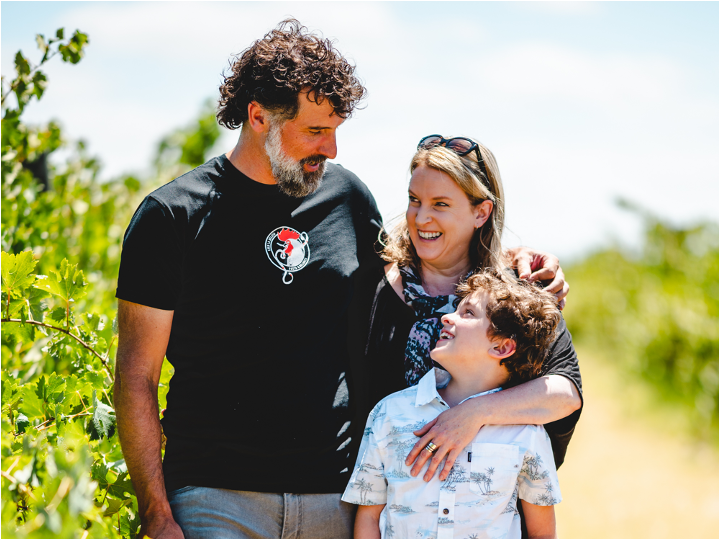
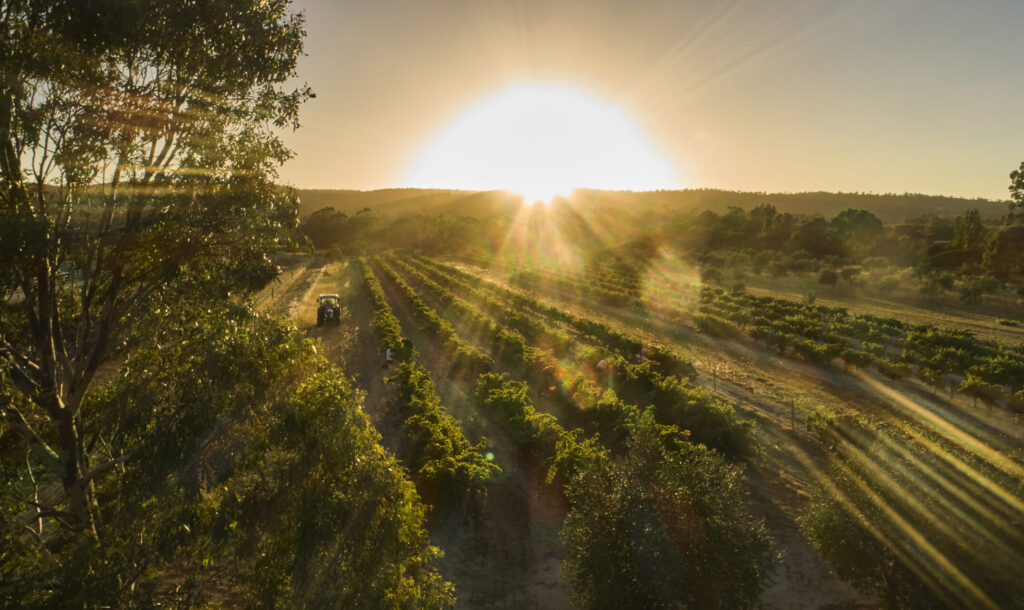
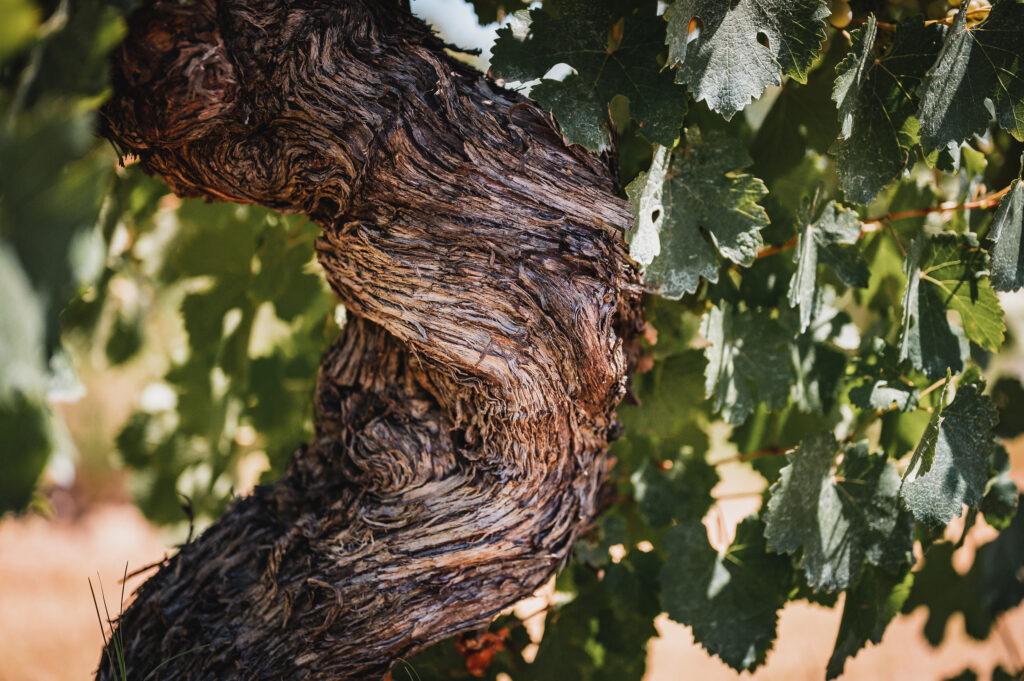
On Labor
For labor we in fact do all this in house for the vineyard – so full time employees. The only time we bring crews in is for handpicking basically and we use Cambodian/Australian contractors. They are covered by the Fair Work agreement here in Australia and that’s what we pay through – in relation to under payments in hospitality this is something we are very cautious about! It does increase our overall fruit price with handpicking (we do 100%) as the award has increased over the past few years quite substantially. Many people this year moved away from handpicking for this reason but I really believe the quality is compromised by machine harvest. We are staying stubborn there.
On Farming and Environmental Practices
We have been driving down this more holistic approach to organic farming path for sometime now and it’s really challenging in the Yarra but rewarding at the same time. We have completely eliminated herbicides here at the Coldstream vineyard a few years ago; we are using a Clemens undervine cultivator. We firmly believe soil health is a high priority so we manage this in many ways including the elimination of herbicides. We sow cover crops in the winter – they are just starting to show now, a mixture of vetch, oats and snow peas. This helps aerate the soil but also brings great nutrients for the growing season and in general. Ultimately we are aiming towards organics but in the Yarra Valley this is extremely difficult with the disease pressure and the organic certification is very different to Europe, for example, where you can use much higher levels of sulphur and copper during the growing season. So we are almost there but in the cooler wetter seasons we need to protect the crop otherwise it becomes unsustainable. As the products evolve I think it will be much easier to get there.
From a winery perspective we have 100kw solar panels (accounts for a good 30% of our power usage). Our whole winery roof and storage shed is covered – we have had these for about 6 or 7 years now and have great results. We also have a really interesting way of recycling our waste both in the winery and kitchen. We have a very extensive automated system that breaks down all the waste matter and water from the drains anaerobically (without oxygen) with a natural population of microbes. This process takes about a week and the clean water is decanted and pumped to our dam for irrigation if necessary. We harvest about 1.5 million litres of water each year through this system. The leftover waste which is really high in organic matter is then decanted from the bottom of a settling tank and we then spray it out in the vineyard. This is similar to some organic teas you may be aware about. Just a very high concentration of good and living microbes that work symbiotically back into the soil system.
On Labor
We have only one full time employee who has wages & conditions well above Australian awards.
The rest of our labour is supplied by a registered agricultural labour agency who pays their workers according to the relevant Australian awards.
On Farming Practices
Giaconda has largely been operating on organic principals for many years and we have been certified since 2019.
We have had solar electricity for 14 years which supplies a very large part of electricity usage. Wines are stored (and Chardonnay fermented) in an underground cave which needs no heating, cooling or humidification.
All vine & grape matter is returned to the vineyard soil.
We are self sustainable in water usage both for the winery & irrigation.
All other areas of the property are left in a natural state with the native trees & no grazing animals.
On Labor
Bird on a Wire is just me outside of vintage, however I do work with many businesses and have contracts with like-minded growers. Making sure that these affiliations have above-board conditions for their workers is part of those relationships. This is particularly important with seasonal workers. For vintage workers, Bird on a Wire pays minimum Grade 2 and follows the Wine Industry Award 2010 as minimum standards.
On Environmental Practices
I love wine and making wine but it is nothing without the environment we live in. Not being a vineyard owner it has always been a challenge to work out how to have a direct effective and positive impact on the environment we love and live in. Whilst the vineyards I work with are always looking at technology and new research to improve how they grow fruit, how my business repays the benefits it receives from the environment must also be part of the equation.
Recently Bird on a Wire partnered with Bird Life Australia and their work is exceptional here in Australia. Then in 2022, my husband and I purchased a block of land in the Yarra Valley next door to an exciting project called Haining Farm. This project is part of the concerted effort to improve the critically endangered Helmuted Honeyeater and Leadbeaters Possum habitat and populations both of which are, as the status suggests, on the brink of extinction. Bird on a Wire profits go directly into us extending these philosophies from Haining Farm to our neighbouring property and to supporting this work through tree planting as well as providing nesting boxes for other species like the amazing Powerful Owl. In addition to this and still in its formulation, we hope to dedicate part of this land to native seed production for use both in regenerative land work and shifting Australian backyards to more sustainable grasses. Both of these projects are in the very early stages but are very exciting and for me, essential.
On Labor
Mt Yengo pays in accordance with Australian award rates (or above), that ensure a livable wage and available healthcare for every worker. We are currently in the process of developing our own vineyard and winery, so in the meantime, we are working with a couple of trusted growers and winemakers in the Adelaide Hills, including Simon Tulley and David O’Leary. Simon describes their work structure as “collaborative work clusters where different contractors perform different task that they specialize in. We always pay above the award for people with good work ethic, able to work well in a team and to those with the required skills we need.” He goes onto describe the work environment in his vineyards as “positive, fun, and community minded; a collaborative business approach with likeminded people.”
On Caring For Country
The vineyards we work with are farmed with sustainability and regeneration in mind: most are farmed with limited to no synthetics and sheep do a majority of the under-vine management. As the only majority Indigenous-owned winery in Australia, our connection to the land is paramount. We believe in the sort of land care that is based on giving back more than using up, that respects the natural inclinations and seasons of the land, and that had sustained our Country for more than 60,000 years.
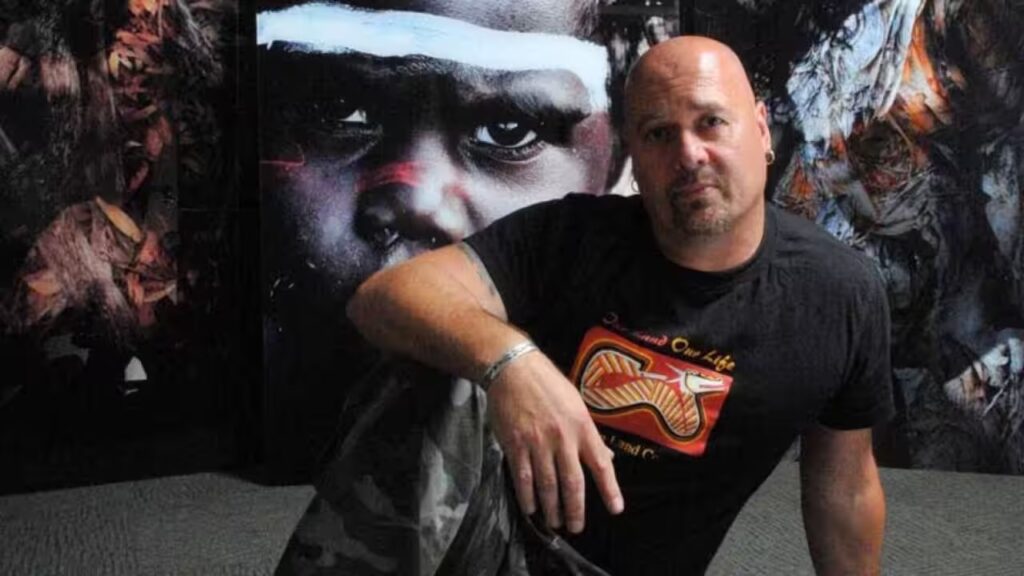
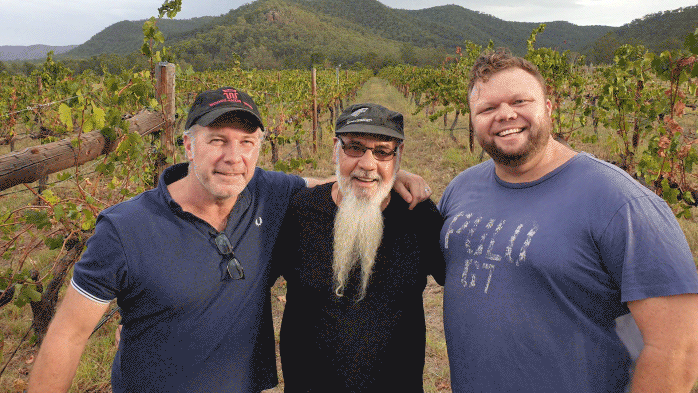
“Mt Yengo was created to bring the values of the First Nations People of Australia and fuse them with the technology and quality from our newest inhabitants to create not only a company or a brand but a community. A community that values bridging the cultural divide, instilling cultural understanding, embracing reconciliation and diversity.
Providing a unique social outcome by giving back to assist in ‘Closing the Gap’ between Indigenous and Non-Indigenous Australians, we invite you to join this innovative and forward thinking community and make a statement to the world. As one we are weak but together we are strong. Embrace the changed delivered in every bottle.”
– Gary Green, Wayne Quilliam, and Ben Hansberry
On Labor
Mother Tongue pays in accordance with Australian award rates, that ensure a livable wage and available healthcare for every worker. Mother Tongue does not employ any full-time employees, instead working with a certified contractor for harvest workers and contracting a winery to do the processing. The focus of Mother Tongue has always been the long-standing relationship with the historic Kraft vineyard, which continues to be hand-tended by its modern custodians.
On Looking After the Land
Mother Tongue works with the historic Kraft vineyard, planted between 1930 and 1940. This vineyard is hand-tended using organic practices with the goal for another 90 years of life – and beyond.
The winery that Mother Tongue works with for processing fruit has outstanding environmental practices as well. After de-stemming grapes, the stalks are fed to their sheep, which are later used for meat. After pressing, the skins are stockpiled, mixed with fowl manure and spread over the vineyard as a mulch/fertilizer. After bottling in winter, the barrels are opened, shaved and stored in a hot shed over summer before re-assembly and re-filling with the next vintage. They use their barrels until they are about 12 years of age, after which they cut them up, and cook with them in the wood oven onsite. All of waste water from the winery is used to irrigate their orchard, which supplies a year round fruit supply to friends, family and workers.
On Labor Practices
Attwoods is a small, family run business, with owner and winemaker Troy Walsh working alongside our full-time viticulturalist, Luke Polson. Between the two, they prune and maintain our three small vineyards with Troy undertaking the majority of winery work. During vintage, we will increase the team by one or two, inviting travelling cellar hands to join the team during this busy time. Troy’s wife Jane looks after marketing and their three teenage children also play their part, doing some vineyard tasks, bottling and labelling. At harvest, picking is done by a mixture of volunteers and seasonal staff. We pay at or above The Australian Wine Industry Award 2022 which ensures a high quality of living for our employees. Permanent staff have 4 weeks paid holidays, paid personal/sick leave and we are a family friendly workplace as we promote good mental health and work life balance. Professional development is also very important to us so training across a range of areas is made available to all staff, benefiting both the business and the employees in their job satisfaction
On Farming and Environmental Practices
Our farming philosophy is to practice sustainable viticulture, and although not certified, we are using organic and some biodynamic principles. Our vineyards, in the cool climates of Ballarat and Macedon, have an average of 650mm rainfall per year, allowing us to be dry grown most years. Our weed management program consists of an under vine cultivator which allows us to control weeds without using herbicides. We also run a small flock of Baby Doll sheep in our close-planted vineyard ‘Mon Climat’ over winter. To control mildew, we use copper and sulphur. With continuous improvement in mind, we are trialing the use of milk whey to reduce our reliance on sulphur which is softer on the beneficial bugs, a part of our integrated pest management program. Soil health is maintained in our vineyards by composting, planting cover crops and green manuring. Our marc is composted and returned to the vineyard, with straw from the property and cow manure from our neighbor. In the winery, ferments are spontaneous with wild yeast and no additions are used. Winery water is all recycled and used to maintain the gardens at the cellar door.
“To make great pinot noir and chardonnay, you have to be on the edge climatically. Our philosophy is ‘without risk, you cannot achieve great reward’ which is tested by having vineyards in some of the coldest climates of Australia. With hard work in the vineyard, we are able to impart a light thumb print in the winery allowing a true expression of terroir.”
-Troy Walsh
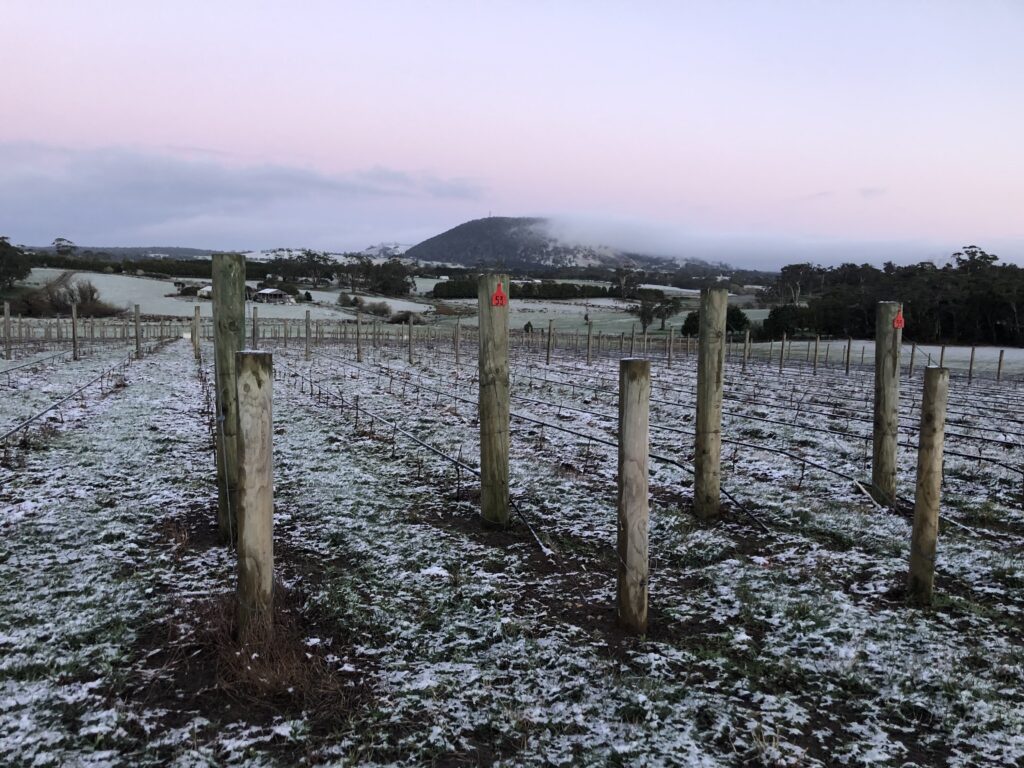
On Labor Practices
We are a small team of 5 humans (3 of which own the business) all paid at wages that we have come to determine are fair in modern-day Australia and are fair compensation for the incredible difference each person makes to our business, through their work. These wages are all 1.4-2x the National Award wage rates. Paying higher wages to our team of course means a lot less profit to the ‘business’ – but we are a business that is here primarily to support our community, our shared planet and our team.
On top of this, all staff receive an annual Good Grant, where each year we give at least 1% of our revenue directly back to the team (the money is divided equally) to spend on personal self- development, health and wellbeing. Good Grants have been spent on meditation retreats, workshops, emotional intelligence programs, acupuncture and an array of other fun and important things (including return flights to an Ayahuasca ceremony!).
We have weekly team meetings and everyone has an active input on how the business is run. And we have an agreed set of Team Values ensuring inclusivity, safety, creativity, respectfulness and intentionality are all upheld within the team, between the team and how we represent ourselves in the world.
On Environmental Practices
We aim to be an example of beyond-best-practice when it comes to both our environmental and social impacts. We are certified organic, vegan-friendly, carbon-neutral and B-Corp and since the start we have planted 1 tree for every dozen sold via our partner One Tree Planted. This means that in reality, by soon after 2035 as our first years of plantings all reach maturity, Minimum will become a carbon sequestration machine, drawing down more carbon each year, than we have generated in the entire life-cycle of our business operations.
In the vineyard we are all about nurturing our soil with a focus on natural inputs such as fermented seaweed, vegetable and fish extracts, good bacteria cultures, natural straw mulches, soil carbon elements such as humid and filmic acid and both perennial and annual cover crops in the inter-rows, many of which we allow to grow totally wild to maximise habitat for small reptiles, birds, insects and other small lives.
We believe in radical transparency and so document all of our social and environmental impacts in an annual report. You can see that here: www.minimumwines.com/impact.
On Labor Practices
A team of 70 work for Seppeltsfield, across the vineyard, winery, production, finance, administration, marketing, sales and cellar door aspects of the business. We take on additional casual employees during the harvest period.
The pay and conditions of all employees meet the provisions of the Australian Wine Industry Award (2020) and the Fair Work Act 2009 and the Australian National Employment Standards. All employees have an employment contract and an annual performance review. Salaries are reviewed regularly and wage increases are kept in line with Award changes.
Culturally, our values are team and respect and we work hard as a group and department specific teams to adhere to these values. Each team has specific trademark behaviours, developed by that team, to hold each other accountable for their behaviour.
Safe work practices are at the core of how we work, with policies and procedures in place to meet legislative requirements and our duty of care to our employees.
Overall, the Seppeltsfield team is a dedicated, hardworking and fun-loving bunch of folk!
On the Environment
Seppeltsfield Wines has recently become a certified member of Sustainable Winegrowing Australia by using the Freshcare Australian Wine Industry Standard of Sustainable Practice – Viticulture Standard and the Sustainable Winegrowing Australia program. We are reviewing all our practices to ensure we are reducing our impact on the environment and encouraging bio-diversity. From solar panels to sheep in the vineyard to using treated winery wastewater for irrigation, we are committed to continuously improving our winegrowing business.
“Seppeltsfield Wines is very much about respecting our significant history alongside an eye to the future. Respecting our heritage in a modern world….working safely in an 1888 winery is one example; another is the careful custodianship of our centennial collection whilst welcoming the modern Oscar Hotel to the estate.”
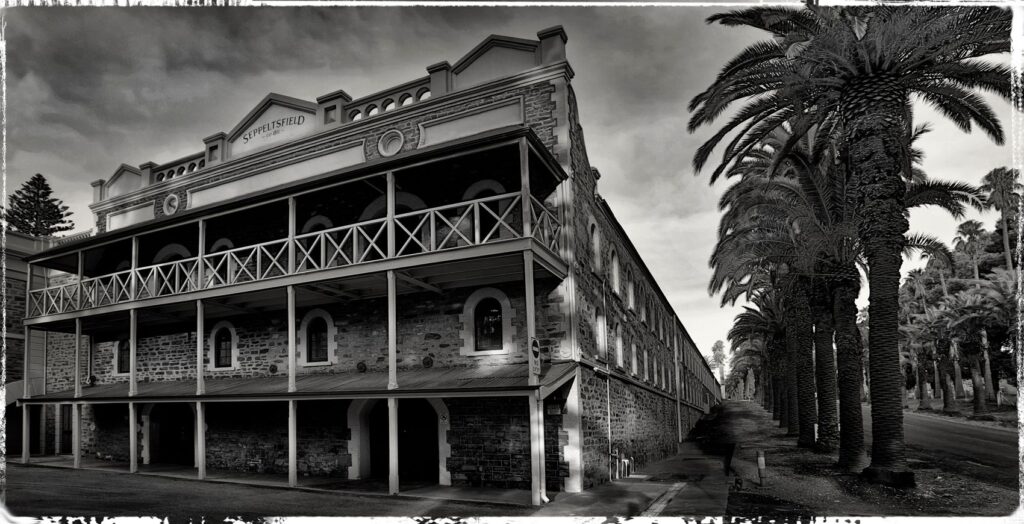
On Labor Practices
Pyren has a core team of three, who share duties between the vineyard, winery and management. We encourage our members to run their own show, and to be their own boss. Practically speaking, this means there is flexibility that best accommodates the lives we lead.
Contract labour is an integral part of achieving our work goals, and we have partnered with the same local workforce for over 6 years in this regard. The team leader of this crew is highly regarded amongst a diverse set of colleagues, both young and old. We respect them and count them as community and are grateful for the work they do.
We pay an hourly rate that is above the standard award for their service.
On Environmental Practices
Pyren has been herbicide free (organic or otherwise) for a handful of seasons, and has applied various organic protocols in the vineyard prior to this time. Composting, under vine mulch and sheep grazing are the primary applications in consideration of farm health. Synthetic fertilizers and fungicides are avoided and water use is managed thoughtfully as the property relies on its own catchment.
We’ll continue to implement what we would consider is best practice, as we continue on the organic pathway.
On Labor
We don’t require much in the way of casual labour: for the most part it’s just me and my wife Pip. We hire casual labour for picking, for laying straw under vine to suppress weeds, for bookkeeping and sometimes for bottling. We pay each member of these crews $34/hour – above the award rate. We also always pay for time spent in transit – if people have to commute a bit to get to a vineyard, we want them to be compensated for their time. We try to make it a comfortable, fun place to work: we always put on drinks, there are (of course) clean toilet facilities, and everyone gets 15 breaks every few hours and then a 30 minute break for lunch – things that are somewhat commonplace here in Australia, but I know not everywhere in the world.
We also encourage our pickers to make sorting decisions in the vineyards – we’d rather it take more time than be done right than rush through the picking. It costs about $600/tonne for an average shiraz vineyard in Heathcote to be picked, but we’re paying about $1300/tonne for the extra care and time we’re asking of workers. It’s about not skimping – about quality as opposed to doing something fast and in a hurry.
On Environmental Practices
When we took over our land, it was bare – it had been used to raise cattle for the last hundred years. Since we originally cleared the land, we have farmed 100% organically. We live right on the vineyard, so we wouldn’t put anything in the soils that we couldn’t have our family eating or breathing.
We’re always thinking of minimal inputs and minimal tread. We have a non-compacting tractor. We use straw as our weed killer: we lay it out by hand under the vines and it suppresses the weeds from growing under vine and retains the moisture. All the canes get re-mulched, put back into the soils. All the marc (leftover grape pomace after winemaking) is given to a local cow farmer for feed – and then is put back into the ground as manure. All our wastewater is put back into the property; we purposefully use a potassium-based cleaner that is non-toxic so we can re-use our cleaning water. We’ve designed our winery to be as energy efficient as possible, with an orientation that captures sunlight where needed and insulation panels to act as a thermal retardant where that’s needed: our electricity bills are quite low (like $70/month to run the whole winery!). We want to be put as little pressure on the environment as possible – and, if anything, give back to it. We, as a tiny winery, haven’t gone forward for organic certification yet, but plan to in the coming years.
On Labor
Experiencing Australian labor practices as an American is enlightening. I long thought that profitable businesses only existed if labor was cheap. Australia proved otherwise. I don’t employ anyone as Micro Wines is not large enough to do so. All employment in Australia is on the books, managed by the strict Fair Labor Board, and expensive. My only direct interaction with it is in the option to pay for fruit picked or un-picked. A difference of at least $600 per ton. I only hope that the end consumer is happy to pay for wines that are produced by people paid a wage that would enable them to enjoy that same wine. Wine picked by people that can’t afford to sit at the same table to drink it is not wine that should exist.
On Environmental Practices
I currently purchase fruit that is either certified, or in the process of being certified organic and/or bio-dynamic. I offset the carbon output of my travel to Australia to make wine, and its freight abroad. As a micro-negotiant I have little control over land, but the small amount of money I do spend on fruit and supply is directed towards those doing bigger and better work.
On Labor
At Moorilla and Domaine A, we have a varied and diverse group of staff. We have between 24 and 33 active staff seasonally (depending on peak times) and this is made up of a mix of casual, full time permanent and part time permanent staff. Our largest staff group is made up of our customer-facing cellar door attendants, followed by hard-working vineyard staff and then a smaller group of expert sales/retail and winery ops teams.
Our employees are diverse in background, with many holding various visas from different countries, and ranging in age from 15 to 65, with tenures spanning up to 17 years with the business. This diversity is important to us as a business, which was shown when we supported our visa holders through COVID-19 when they were unable to access government support.
In terms of pay, we pay casual staff 7.5% above the relevant award rate (which is either Hospitality Industry Award or Wine Industry Award depending on role) and permanent staff are benchmarked against the award and using the annual salary guide. We offer 4 weeks annual leave and 10 days personal leave for permanent staff. We also provide access to 10 days of family and domestic violence paid leave and 5 days paid compassionate leave for all employees (including casuals). Since COVID-19 all staff are welcome to access covid special leave to support them when they are unwell and miss work due to COVID-19.
The Moorilla winery existed before Mona, but now makes up a key part of a wider group of departments that are all owned and operated by David Walsh. Our wider Mona team is made up of over 600 casual and permanent staff year round (more during festivals!) within a huge range of industries.
On Environmental Practices
The land to which we owe our livelihood is ancient. We acknowledge that we are not the traditional owners of the land, and that our understanding of how those owners managed the land for millennia before European invasion and colonisation is limited or lost.
Since European colonisation, the land that we grow our vines on has been degraded. Over the past fifteen years, work to concertedly put back more than we take out from our soils has begun. Our approach has been to do what’s best for the soil, what’s best for the vines and what’s best for the wine—ideally all at the same time.
Moorilla was an inaugural member of the Tasmanian wine industry’s sustainable growing program—Vin0. We were also heavily involved in the creation of the program as part of our efforts to work with the greater Tasmanian wine industry and its many smaller vineyards.
We have undertaken a long-term approach to land management. Much of the Moorilla vineyard was planted with an odd trellis system which makes organics very impractical. As such, we’re eight years into a twenty year program to entirely replace the existing vineyard so that we can switch over to fully organic production. While we might proceed slowly, it’s about trying to do the best job and rebuild for continuing future success. Domaine A is beginning this process too, and we’re doing internal research to look at how we can best enrich our soils without changing our wine quality.
The winery is an example of this long-term approach. After nearly fifty years of winemaking onsite we redeveloped the winery so that our infrastructure keeps our energy use low. We’re now gravity powered, our wastewater treatment is entirely self-contained and waste energy is redirected to powering other areas of production. We work with others in our region to compost our green waste and are a member of the Australian Packaging Covenant Organisation. As part of our membership, we are annually audited on our packaging use for Moorilla and Domaine A, as well as the other areas of our business that are more tourism-oriented.
“As part of one of the oldest winemaking families in Australia, spanning back 6 generations, we strive to preserve and protect the land, while continually building on the rich cultural tapestry of Australian Wine. Our philosophy is uncomplicated and respectful; a stubborn commitment to a more holistic way of farming that knows and cares deeply for soil health, our vines, our people and the environment.”
– Gen & Rob Mann
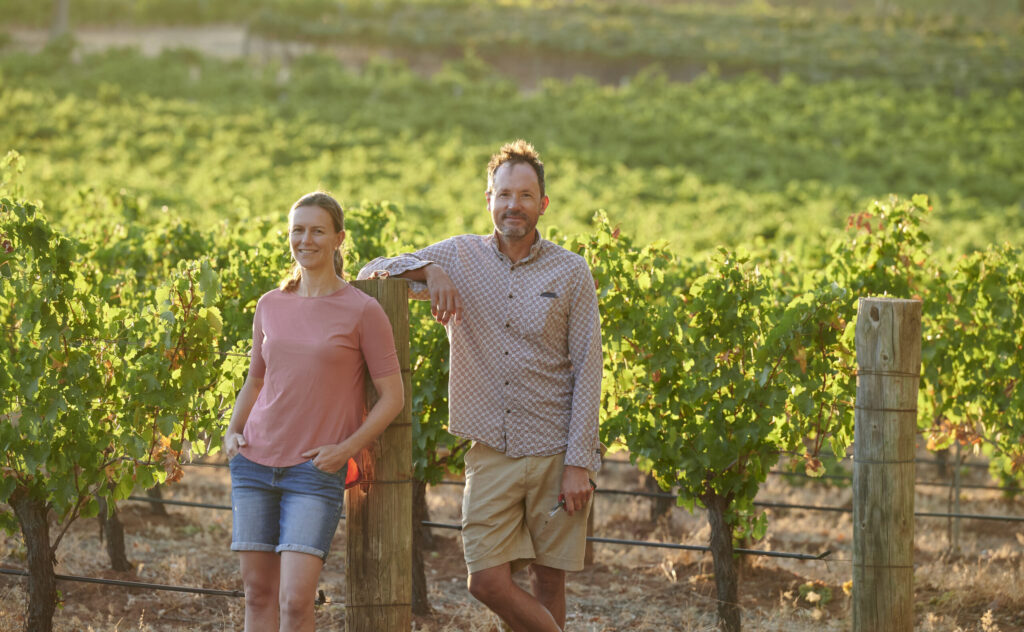
On Labor
Our dream at Corymbia was to have no employees. Just the two of us; our own vineyards, the wines made by us, the way we want. We eventually realised we need some help from time to time, given the work involved in farming multiple vineyards almost 300 km apart, as well as the complexities of running a small wine business and raising a family. In addition to our two boys, a dog, a little tractor, and a farm Ute we have embraced some additional help in the vineyards. Keith, a 69-year-old master pruner and vineyard all-rounder is central to our team, and we employ occasional help through the growing season, particularly for the hand harvesting of all our grapes. We ensure our team is paid fairly, as governed by the Australian Wine Industry Award, which significantly outstrips what we pay ourselves.
On Environmental Stewardship
Inspired by a 3-year stint living and working in Napa Valley, California, it was instinctive to farm our vineyards organically. Our Rocket’s Vineyard in the Swan Valley is now ACO certified organic, and all our vineyards are certified under the national Sustainable Winegrowing Australia program. Our farming philosophy is inspired by multiple generations of Mann vignerons. Dry grown vineyards that are farmed with acute attention to detail to ensure we capture the history and personality of each site rather than relying on winemaking artifact. As Jack Mann said: “Nature is the winemaker and man – if he is skilled – gives nature the opportunity to perform to its best advantage.”
Our Calgardup Vineyard in Margaret River is surrounded by 160 acres of native bush, bordering the Leeuwin-Naturaliste National Park and the Indian Ocean. We are lucky enough to be custodians of this land and environmental stewardship is at the very core of our mantra every day. In addition to organic farming, we are committed to protecting and enhancing the biodiversity of the land working closely with Nature Conservation Margaret River to help guide our decision making.

